SPOTLIGHT ON LEADERSHIP & MANAGEMENT
HOUSING DEVELOPMENT
Are you a leader?
Meet some of the best

SPOTLIGHT ON LEADERSHIP & MANAGEMENT
HOUSING DEVELOPMENT
Are you a leader?
Meet some of the best


Editor-in-Chief
Nicky Godding Tel: 07966 510401 nicky.godding@nkmedia.co.uk
Commercial Director
Kirsty Muir Tel: 07971 912020

kirsty.muir@nkmedia.co.uk
Customer Services enquiries@nkmedia.co.uk
Accounts accounts@nkmedia.co.uk
Magazine Design
Brace Creative Agency www.brace.co.uk
Magazine Printers
Severnprint Ltd www.severnprint.co.uk
Chief Photographer: Rob Lacey www.roblaceyphotographer.co.uk
Contributing Editor
Anita Syvret www.syvretmedia.co.uk
Sub Editor Joyce Matthews

Business & Innovation Magazine is a bi-monthly magazine published by NK Media Ltd. Our readers are business owners, senior executives, key influencers, entrepreneurs, innovators and those working in further and higher education, and government departments. Any opinions expressed by those quoted in this magazine are their own and do not necessarily represent or reflect those of Business & Innovation Magazine, or of NK Media Ltd. No part of this publication may be reproduced or used in any form of advertising or promotion without the written permission of the Editor-in-Chief or Commercial Director.
ISSN 2514 - 7609
Member of the Professional Publishers Association

07966 510401
nicky.godding@nkmedia.co.uk @Nickywritesbiz
Welcome to our jam-packed first anniversary issue of Business & Innovation Magazine, our biggest yet.
It’s been a truly fantastic year. We’ve not only launched what we think is the best-by-far business magazine in the region, with its unique and high-quality design, editorial and photography, but also unveiled our new website. This offers an online news service for business and provides an important business research resource.
Everything we’ve published, online or in our magazine, is available for our readers to read again. It will help track how businesses are growing and adapting to the changing demands on them.
We’ve also held our first Manufacturing Live event. A capacity audience at our first hosts, Safran Landing Systems, Gloucester toured the manufacturing facility and listened to Safran Managing Director Chris Wilson candidly discuss his businesses issues and opportunities. We’ll be holding our next Manufacturing Live event later this year.
We’ve got out and about across the region, revealing and reporting on the most exciting, innovative businesses across our patch. And we’ve hardly scratched the surface yet. There’s so much more to come.
Most of all, we’ve been thrilled with the stonking support of the business community. You’re embracing the magazine with enthusiasm, so we know we’re making a strong contribution to the regional business community. The more news we publish, the more business opportunities will be revealed.
Here’s to the next 12 months, there’s so much more to come.
Please contact:
COMMERCIAL PROPERTY
P100
P91 HOUSE BUILDING

P53
SPOTLIGHT ON MANUFACTURING

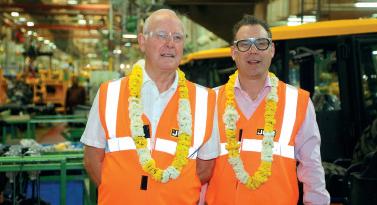
SPOTLIGHT ON LEADERSHIP
P65
P10
BUILDING A REPUTATION
BRICK BY BRICK
SPOTLIGHT ON INNOVATION
P41




Jaguar Land Rover and Waymo will develop the world’s first premium selfdriving electric vehicle for Waymo’s driverless transportation service.
Waymo (formerly the Google selfdriving car project) will work with the car manufacturer to design and engineer self-driving Jaguar I-PACE all-electric vehicles.
Waymo Jaguar I-PACEs, equipped with Waymo’s self-driving technology, will start testing later this year. Up to 20,000 I-PACEs are planned to be built in the first two years of production and be available for riders of Waymo’s driverless service, serving a potential one million trips per day.

Prof Dr Ralf Speth, Jaguar Land Rover CEO, said: “With the Jaguar I-PACE we have a world-beating car that’s captured the imagination of customers around the world.”
The Moasure ONE has been developed and created by 3D Technologies, based at the University of Warwick Science Park’s Innovation Centre.
Described by the company as the world’s first motion-measure, the equipment accurately measures volume, area, circumference, height, angle and level by simply moving. The company has been developing the product since 2014.
Following on from the success of its Moasure smartphone app, the company has now launched a Kickstarter campaign. The Moasure ONE increases the measurement accuracy of the app and adds a further 20 ways of measuring.
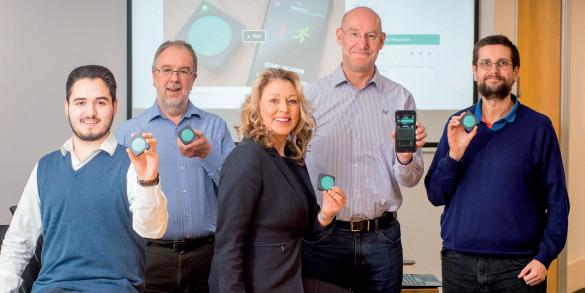
Alan Rock, 3D Technologies founder and CEO, said there were no other devices like this available in the world.
“Motion measuring is the technology used in rocket guidance systems to keep track of movement in 3D space.
“Moasure uses this same technology to take and calculate precise measurements.
Moasure started as an app for iPhone and Android phones, but its accuracy was limited to existing phone technology.
“Now we are taking it further with a physical tool that will work with a phone.”
The company plans to start shipping in November and it can be used by tradespeople from plumbers to estate agents and for those doing DIY around the home.
“The Kickstarter money will be used for manufacturing and further development of the technology,” said Alan.
The product fits in the palm of the hand. Powerful motion sensors propel Moasure ONE to a level of accuracy and versatility that can’t be beaten by lasers, GPS, or camera-based apps, said Alan.
3D Technologies, which has a team of nine, has been supported by the University of Warwick Science Park.
“The Kickstarter money will be used for manufacturing and further development of the technology”
A new tool that could change the way people measure accurately is set to be launched by a Warwick company.Beril Ismail Sezmis and Trevor Tapping from 3D Technologies, Jane Talbot, centre manager at the Warwick Innovation Centre, Alan Rock and Eduard Kriegler from 3D Technologies
A clever way to get gardens blooming has won the Worcestershire Innovation Network (WINN) £12,000 prize in its ‘Make It Happen Challenge’.
Developed by local entrepreneur Nikki Hollier, Border In A Box is a ready-made garden kit. It provides a template for a garden border, illustrating which plant goes where and a shopping list of what to get from the local garden centre. To ensure swift results, two packets of seeds are also included to maximise colour in the first year while the main plants mature.
Nikki said: “I’m absolutely delighted. It will help my business so much this year especially with my show garden border at Gardeners’ World Live in June.
“It will also help me with product development.”
Nikki ditched a 20-year career in the world of IT to start her business. After studying horticulture at Pershore College and design at the Cotswold Gardening School she created readymade border templates to help everyone plan a garden border easily in less than a day.

The Make It Happen challenge is organised by WINN – a Worcestershire County Council and Worcestershire LEP initiative. The organisations have formed a collaboration of the region’s best innovators to advance ideas and entrepreneurs, and help businesses develop their products or services.
The £12,000 prize is made up of a £5,000 cash reward, together with packages from the Make It Happen sponsors (all Worcestershire businesses) totalling £1,000 each.
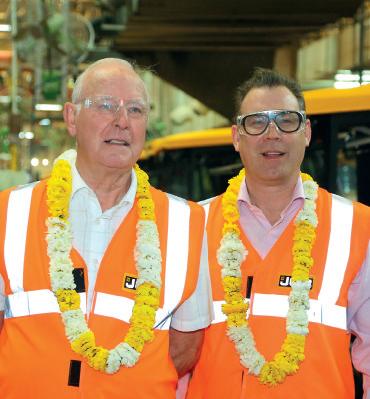
In the headlines
Eight companies from across the region have appeared in the 2018 Sunday Times BCO Profit Track 100 league table which ranks Britain’s 100 private companies with the fastest-growing profits over their latest three years.
Lioncourt Homes, Worcester came in at 12th position. The housebuilder completed the sale of 290 homes in 2017, five times more than in 2014. The table ranks its annual profit growth at nearly 105 per cent.
Oxfordshire-based Grundon Waste Management, a family business which helps companies divert waste from landfill for recycling, came in 16th position. Grundon’s Energy from Waste facility near Heathrow generates enough renewable energy to power 56,000 homes.
The other regional companies appearing in the top 100 are construction management company
MCS Group and Edenhouse IT services contractor, both based in Warwickshire.
Also on the list are online sportswear company Gymshark based in Solihull, construction service company Benniman of Bromsgrove, Coventrybased systems integrator Optilan Telecoms and appliance design and manufacturer GTech of Worcester.
Oxford-based Fast Track, which compiles the list, was founded by Hamish Stevenson in 1997.
Since then more than 5,000 companies have featured in its seven league tables, which include the SME Export Track 100 ranking Britain’s top 100 small and medium-sized companies with the fastest-growing international sales over the latest two years, its Tech Track ranking for the country’s top 100 tech companies and Top Track 100, rank of Britain’s 100 private companies with the biggest sales.
Norman and Neil Grundon, Grundon Waste Management, on a visit to JCB in India last year. Grundon came in 16th position in this year’s Sunday Times BCO Profit Track 100 Nikki Hollier of Border In A Box
Specialist packaging company GWP Group has won the Best in Show, Gold and Sustainability awards at the Starpack Industry Awards for its James Dyson Foundation pack.
Now in their 58th year, these are the UK’s top awards recognising innovation in packaging design and technology.
The Cricklade-based manufacturing company’s winning pack was a reusable, multi-trip package that allowed the James Dyson Foundation to supply a Dyson Desk-Cooler product and supporting literature to schools and colleges nationwide via courier.


The predecessor to the redesigned pack displayed very little engineering thought, said GWP. It was heavy, slow to manufacture, difficult to assemble, didn’t
provide adequate protection and was inefficient in terms of material and cost.
The company also won a silver award for its pack designed for high-end lighting designer Haberdashery in the Home Delivery category.
David Mason, Sales Director at GWP Packaging said: “Our business places a strong emphasis on our design expertise and service that we offer to our customers, which is reflected in having more designers than the vast majority of other packaging companies.”
GWP also recently announced another successful year of trading with a strong increase in turnover and new business.
In the headlines
Following a £1 million investment and two years of research and development, Prima Dental has launched a new digital dentistry division called Prima Digital.
A world leader in the design and manufacture of dental burs (tiny drill pieces for teeth), Prima Dental has developed a new product range for the rapidly-growing digital dentistry segment.
Based at Prima Dental’s base on Waterwells Business Park, Gloucester, Prima Digital will manufacture and supply global customers with new CAD/ CAM milling tools used in dental labs around the world.
Prima’s Head of Research and Innovation Dr Marilyn Goh, one of Europe’s leading carbide tooling experts, spearheaded the technology behind the new product range.
Dr Goh said: “The reaction to the launch of our new division and product has been fantastic. We envisage that Prima’s long-term growth will be greatly shaped by our digital offering.”
In field testing the tool outperformed the market leaders by nearly 30 per cent in terms of tool performance, the company said.
With a team of 215, Prima Dental has invested £3 million in a purpose-built
turnover increase by nearly nine per cent in 2016-17, up from more than 100 people in
facility to complement current operations at Gloucester. This new facility has doubled the company’s manufacturing capacity.


“Our reputation is our priority. We want to be known for the way we do business and aim for a friendly and proactive manner. We want to be our clients’ partners”

Construction is one of the toughest industry sectors. Investors and developers will always bear down on costs, and skilled tradespeople are often in short supply.
By Nicky GoddingThe construction company is on the front line. It must deliver a best-in-class building while achieving the sometimes lofty ambitions of architects. It must also find practical ways to integrate new technology, meet increasingly ambitious European sustainability standards and the forensic financial analysis of quantity surveyors.

Some construction companies look to reduce costs through ill-advised acquisitions of businesses where they have little expertise, but as we’ve seen with Carillion, which branched out from its core construction into all sorts of ancillary businesses, such a strategy can be doomed to failure.

Better to continually invest in doing better what you already do very well.
That’s the story of Gloucester-based Barnwood Construction. For more than 55 years it has been building a reputation for quality, collaboration and delivery. It’s also responsible for some of the region’s highest profile commercial buildings, from the second St James’s Place HQ building in Cirencester to the stunning Innovation Centre at global manufacturer Renishaw’s Wotton-under-Edge headquarters.
Barnwood Group turned over £85 million last year with around 250 employees. It is divided into commercial construction where it works across the south and south west of England, its national shopfitting company, Barnwood Shopfitting and Barnwood General Works. The business will only dip its toes in the residential development sector when building flats or student housing.
Barnwood’s Managing Director is Simon Carey, who has been with the business for 14 years.
“Our reputation is our priority. We want to be known for the way we do business and aim for a friendly and proactive manner. We want to be our clients’ partners,” he says.
Barnwood’s workforce are the key to its success, says Simon. Some of the company’s employees have been there for 30-40 years with three having achieved 50 years. “They’re modest guys who don’t make a song and dance about it, they just want to do their job,” says Simon.
“We do our best to treat people with respect and give them opportunities,” he adds. “Being a director of Barnwood is like being a custodian. We want to pass a successful business on to the next generation of directors and we are already readying people for those roles.”
Simon hopes that Barnwood’s former directors feel the business is still being run as they intended. “A couple of them still call into the office regularly. Their influence is still here,” he adds.
He also pays tribute to the company’s suppliers and sub-contractors. “They are what make us successful and many have worked for us for decades.”
A long way from the old days of construction then. “When I worked for a national contractor in the early 1980s, it tended to be a battleground. Claims would be made against clients and subcontractors, all in an effort to eek a profit out of a risky business. The industry has changed significantly and contractors need to be collaborative. Clients have a choice. When a development works for them it also works for us and our supply chain.”
Simon joined Barnwood when it was turning over around £35 million. It’s now more than doubled and could hit £100 million this year with a fair wind behind it. But while that’s an ambition for Simon and
A family man, he lives near Cheltenham 01
02 03 04
He supports Gloucester Rugby (what other rugby club would he support!)
A petrol-head, he loves the feel of ‘two wheels only’ with an open road ahead of him
Catch him on his BMW motorbike this summer traversing the Pyrenees
his co-directors, it’s not the be all and end all. “We’re looking for organic growth, not massive expansion.”
The 2008 recession dealt a heavy blow to the construction industry. The Board responded by launching Barnwood General Works. “Barnwood had traditionally not taken on building contracts under a million pounds, and we were missing out on work so we appointed Guy Cook to head that
division and it’s now turning over around £6 million,” says Simon.
Barnwood General Works allowed the business to avoid redundancies by redeploying people, but the biggest thing Barnwood did to counter the recession was to widen its region. “We focused on the M4/M40 corridor and were fortunate to win significant work in Surrey.”
In 2013 the company invoiced more work in Surrey than in its Gloucestershire heartland, having been contracted on major works for the University of Surrey, including student accommodation and commercial buildings on its research parks.
It has continued to fill in the geographical gap, recently completing a major 70,000 square feet Grade A office building at Oxford Science Park.
In Cheltenham, Barnwood Construction is building another Grade A office space for Formal Investments on a prime site. Honeybourne Place will go to the market later this year. In Gloucester the company is working on a mixed-used project, including 47 flats, hotel and retail premises at Baker’s Quay for developers Rokeby Merchant.
“We still work on many industrial buildings, like the units we’re building for St Modwen at Quedgeley in Gloucester and Avonmouth. We also work with other developers including Robert Hitchins and Ashville, both of whom we have worked with for decades.”
Barnwood Shopfitting has its own stable of high profile clients. “We are currently working with the Nationwide Building Society and WH Smith, along with fashion brands such as H&M, Debenhams, Monsoon, Accessorize and Jigsaw,” adds Simon.
The Gloucestershire landscape has seen massive changes, but Simon is positive about the county’s future.
“Gloucestershire has a lot to offer, particularly in the high-tech and cyber industries. Our success is closely associated with that of our clients and with the prospect of a development of a new cyber park near GCHQ, this growing number of technology companies is just what Gloucestershire needs.”
But the county is in competition with its neighbours. At Worcester Six, just off junction 6 of the M5, Siemens is investing £27 million in a new manufacturing facility for Worcester-based Material Solutions Ltd, its additive manufacturing 3D printing specialist.
Barnwood works in Worcestershire too, having worked for GTech, one of the UK’s fastest-growing independent companies which designs and manufactures cordless home and garden appliances, and Sanctuary Housing in the centre of Worcester.
Simon added: “Gloucestershire has to be aware that if permission for development is refused, that development will go elsewhere.”
Several of Barnwood’s board directors started at the company as apprentices and
A number of landmark buildings are changing the regional landscape. One key development was the new Princess Royal Grandstand at Cheltenham Racecourse, though it wasn’t built by Barnwood, but by Kier Construction. “It’s an exceptional building and we did supply some of the joinery in the building, so we played a small part,” says Simon.
However, Barnwood has built many stunning buildings, including the second building for St James’s Place wealth management company in Cirencester.
It’s currently building the new Forest of Dean College at Cinderford. Designed by Gloucester-based architects Roberts Limbrick, this challenging project involves constructing the first new building on the town’s Northern Quarter redevelopment said Simon.

“It had to be built within the cost constraints of the college, on a site with ecological issues. It’s also the site of a former open cast mine which was filled in during the 1970s.”
the company is keen to maintain this ladder of opportunity.
“We try to offer all our staff development with the company,” says Simon. “We take on a lot of apprentices through the workshop, in the office and on our sites and we’ve always trained even in the depths of a recession.”
The company trains through local colleges, including Gloucestershire and Stroud Colleges, and the CITB.
Barnwood also treats its subcontractors with more respect than some others.
“We’re ahead of the industry norm in our payment terms and always pay our contractors on time. After the Carillion debacle, this will become increasingly important. We don’t want people going out of business through no fault of their own.”


Moreton Valance-based logistics group CM Downton has been bought by the Hong Kong-based private equity investor EmergeVest in a £75 million transaction.

EmergeVest acquired the entire shareholding from the Downton family and will provide additional capital to finance the company’s growth. Investec Bank plc supported EmergeVest’s acquisition of the company.
The Downton family will continue in their senior management roles.
This is EmergeVest’s seventh acquisition in the UK logistics sector since being formed in 2013. Its current UK portfolio includes Adjuno, Allport Cargo Services, NFT Distribution, NR Evans and Palletforce.
Downton generates annual revenue of £120 million and employs around 1,350 people across the UK. Its client list includes AB InBev, Dyson, Whirlpool, Fever-Tree, Saica Paper, UPM-Kymmene Corporation, Frontline and Marketforce.
Heath Zarin, CEO and Managing Director of EmergeVest said: “We are excited be investing in a business with such significant potential.”
“The sale of the business has not been taken lightly, however this business is now ready for fresh energy, vigour and focus”
Andy Downton, Managing Director of CM Downton, said: “The sale of the business has not been taken lightly, however this business is now ready for fresh energy, vigour and focus. EmergeVest has a great vision and is building an unrivalled UK network, encompassing freight forwarding, pallet, chilled and now our ambient network.”
EmergeVest Logistics’ UK Business Platform now generates more than £700 million of annual revenue.
Folk2Folk, the peer-to-peer lending platform for local and rural businesses, revealed it has lent £200 million in capital to hundreds of local businesses across the UK.
The Tewkesbury-based organisation’s lending milestone was reached thanks to
Evesham-based Countrywide Farmers plc, one of the UK’s leading suppliers of products, services and advice to the rural community, has entered administration.
The country retailer had 48 stores across the West of England and into Oxfordshire.
Last October, the Countrywide Board agreed terms to sell its retail business to Mole Valley Farmers Ltd. Completion of the sale was subject to review by the Competition and Markets Authority which did not give its approval, and the process was referred into a Phase 2 process, which can take up to six months to conclude.
The delay was the final straw for Countrywide Farmers. Its Board filed a notice appointing David Pike, Mark Orton and William Wright, partners of KPMG LLP to act as administrators of the company.
A Countrywide Farmers statement said: “It is with significant regret that the Countrywide retail business which trades from 48 stores and employs over 700 staff will now face a very uncertain future.”
The business launched in 1902 when Beckford Farmers merged with Winchcombe, Toddington & Cotswold Farmers Association to form West Midland Farmers Association Limited.
a growing community of local lenders who have placed £20,000 or above on the lender’s platform. The average lend now exceeds £65,000. Lenders receive 6.5 per cent per annum interest, paid monthly.
Giles Cross, Folk2Folk CEO, said: “Reaching £200 million highlights
the important role Folk2Folk plays in rural areas, providing a lifeline to many businesses seeking debt finance for growth, diversification or development. That said, £200 million lent cumulatively isn’t the metric that really excites me. What motivates me is the number of businesses we’ve helped access the capital they need.”



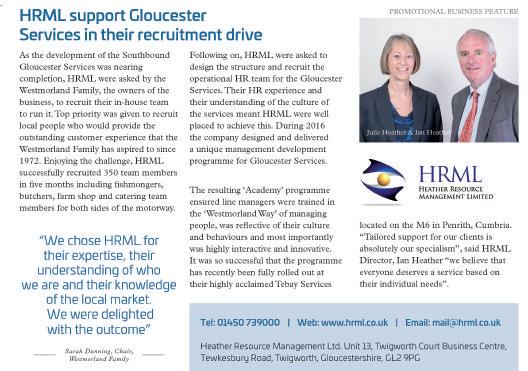
Real ale, original watercolour prints, designer loafers and a vermin control business were some of the businesses promoted by student entrepreneurs at the third Cirencester Youth Market.
Commercial enterprises created by present and former Royal Agricultural University (RAU) and local school students sold their products in Cirencester’s Market Place.
The market, which offered stalls selling food, drink, crafts and services, was organised by Cirencester Town Council and the E4 Group (Royal Agricultural University, Cirencester College, Deer Park School and Kingshill School) which supports young enterprise.
The event was sponsored by Lumley Insurance.
Jen Winnett Art sells prints and greetings cards produced from sustainable materials. The 23-year-old, who studied International Equine and Agricultural Business Management at the RAU said: “It has been amazing, with lots of support
from the community. The cards I sell carry my own artwork and are produced on sustainable cards using vegetable-based ink. I want to bring colourful, affordable and original art into people’s homes.”
Ten per cent of the profits from Jen’s cards go to UK cancer charities.
Cheltenham Racecourse, the home of jump racing, saw a new record total attendance of 262,637 at this year’s Cheltenham Festival.
Gold Cup Day, the fourth and final day of The Festival, was attended by 70,684 racegoers, a sold-out crowd.
The 66,384 crowd for St Patrick’s Thursday, the third day of The Festival, was a new record for the day since the Festival expanded to four days in 2005.
Ian Renton, Regional Director, Jockey Club Racecourses South West, said:
“I’m delighted that we have attracted a record attendance. The Festival is getting better and better and we now have the facilities to match the quality of the racing.”
The entrepreneur from Elkstone, near Cheltenham, added: “This event shows that young people are a force for social good as well as just making an economic contribution.”
The market is open for young traders under 30 who live within 15 miles of Cirencester.

Regional Round-up
A new e-commerce site for bedlinen, bedfolk.com, is being launched by Nick and Jo James.
After a career in the city for Nick, who worked for five years in commodities for Macquarie Investment Bank, and Jo’s background in interiors retail (the family business Lorford’s Antiques is based in Tetbury), the couple have launched Bedfolk.
The team have successfully used social media to build awareness of their brand well ahead of launch. They have an
Instagram following of more than 9,000 and are aiming for 10,000 before launching this month.
Nick said: “We were inspired to start Bedfolk while shopping for our first flat in London. Buying bedding was uninspiring and expensive.
“We moved back to where Jo grew up in the Cotswolds and spent 12 months developing the perfect sheets, travelling around Europe to source the best materials and find the most skilled craftsmen to partner with.”

A new marketing, creative and digital agency has opened in Dursley. Energy Creative offers marketing and communication services including branding, creative and digital. Director Victoria Munday, said: “Energy Creative works on diverse projects of all sizes. One day we’re crafting an employee engagement programme, the next we’re launching websites and preparing brochures for a conference.”
The agency is already expanding and has ambitious plans for the future.
“This event shows that young people are a force for social good as well as just making an economic contribution”Jen Winnett Art at the Cirencester Youth Market Lucinda Hill and Victoria Munday of Energy Creative

Julian Dunkerton, one of the founders of Cheltenham-headquartered Superdry, has left the company to devote more time to his other business and charitable interests.
Julian said: “I am immensely proud of everything achieved at Superdry during the past 15 years. As a fast-growing, innovative business, Superdry has always evolved to ensure it keeps delivering. With other demands on my time it is the right point to transition my focus and responsibilities.”
Peter Bamford, Superdry Chairman, said: “With Superdry embarking on the next phase of its ambitious growth plans, and with other interests and opportunities available to him, Julian and I have been talking for some time about the right time for him to move on from the business. I have enjoyed working closely with him
over the last eight years and, on behalf of the Board, I would like to thank Julian for his outstanding contribution in building Superdry into such a great brand.”
Born from a creative collaboration between entrepreneurs Julian Dunkerton and James Holder in Cheltenham in 2003, Superdry is a British fashion success story. Superdry operates through 515 Superdry branded locations in 46 countries. There are 139 owned stores across the UK and mainland Europe, 208 franchised and licensed stores, all but one outside the UK, and 168 concessions.
Superdry.com sells to more than100 countries worldwide, operating from 21 international websites.
Regional Round-up
Cheltenham-headquartered soft drinks brand Overhang has announced a rebrand with the launch of a new bottle design.

The new packaging is now available in supermarkets and convenience stores.
The rebrand came about after market research carried out by the start-up drinks brand. While the ingredients and formula will remain unchanged, it is hoped that the newly designed bottle will appeal more to the healthconscious consumer.
William Wilkinson, Managing Director of Overhang Drinks
Delicious Italian Gelato made in Cirencester from local cow’s milk is now on sale at the newly revamped M5 Strensham Roadchef Services southbound, inside a new Spar store.
Dolcetti is also celebrating being awarded the RSPCA Assurance accreditation – the first ice cream producer to receive this in the UK.
explains: “Our market research was our first opportunity to understand who was buying Overhang and why they were buying it, as well as who wasn’t and why they weren’t. With this invaluable feedback, we were able to come up with the concept for a fresh design. With the introduction of the sugar tax levy, this is great timing for Overhang to show off its new image.”
Overhang was launched in 2015 by a father and son team. It contains orange, ginger and lime, with botanicals including milk thistle, raspberry leaf and burdock root, and vitamins. Overhang can be found on the shelves of more than 1,500 stores including Morrisons, Tesco, Asda, Holland & Barrett and Spar.
This is the latest coup for Rob Gibson, who launched Dolcetti in the UK in 2013. South African-born Rob learned to make the creamy ice cream and helped establish the biggest chain of ice cream parlours in South Africa.
Arriving in the UK more than 20 years later, he launched his own brand. This family-run business now supplies local caterers, hotels, pubs and restaurants, as well as serving the public from its Love Lane factory, where they can watch the ice cream being made through a huge viewing window.
Rob said: “We’ve come a very long way since 2013. Last year, among other events, we supplied Windsor Polo Club and Anton Mossiman, as well as providing our ice cream in the Patron’s Pavilion at the Royal International Air Tattoo. We have doubled the size of our Cirencester factory and focussed on growing the wholesale side of the business.”

Pershore-based catering equipment specialist Sprint Group has installed four bespoke commercial kitchens at Annabel’s, the legendary members club in London’s Mayfair.

The kitchens include a preparation and laboratory area.
The cook suites include specific appliances for varied requirements, 10 purposebuilt cold and freezer rooms, bespoke ventilation canopies, pizza and proving ovens and a dedicated pastry kitchen.
Sprint Group Project Manager Mark Chillingworth said: “This was one of the most challenging but rewarding projects I’ve ever been involved with, but the whole
team is delighted with the result. We liaised closely with executive chef Julien Jouhannaud, the site project team and subcontractors.”
Paul Jenkins, Purchasing Director of Caprice Holdings, said: “Sprint delivered superbly designed kitchens on time and of the highest quality.”
Founded in 1994, Sprint has supplied many other national brands including supplying Daylesford, Hotel Chocolat, The Ivy Collection, Brasserie Blanc and Soho House.
Last year the company was named among Worcesershire’s fastest-growing mid-sized businesses.
Worcester-based wireless broadband specialist, Airband has been shortlisted for a top tech award.
The firm, based at St Mary’s Street, is in the running to win the tech growth business of the year award in the 2018 National Technology Awards.
Airband was nominated for delivering superfast broadband projects worth £23 million over the last two years to more than 30,000 houses and businesses in rural areas in England and Wales.
The awards are organised by National Technology News and celebrate pioneers of new technology.
Airband director Red Peel said: “In the post-Brexit world, tech-focused innovation is even more of a gamechanger for British business.
“We’re proud to be playing our part in creating the best possible infrastructure for rural broadband, using the most innovative and effective solutions.”
A family farm at Pershore has been awarded £23,000 from a LEADER grant to purchase new equipment.
Richard Revill and his family, who run Oak Tree Farm, grow vegetables on 390 acres. They grow and pack around 1,400 tons of potatoes per year for the chipping markets.
The grant has enabled the farm to buy an automated potato sack palletising system, helping the Revills nearly double hourly production and reduce costs.
Richard said: “The increased production has meant that orders have been met on time and further orders placed because of our increased productivity.
“The increased production has meant that orders have been met on time and further orders placed because of our increased productivity”
“Automation has also meant that we have increased our haulage efficiency. Most of the haulage leaving the farm is now at or near to their maximum weights reducing haulage costs and pollution per ton of potatoes.”
LEADER is part of the Rural Development Programme for England and is delivered locally by Worcestershire County Council and the Worcestershire Local Action Group on behalf of Defra. The project has received funding from the European Agricultural Fund for Rural Development under the Rural Development Programme for England.


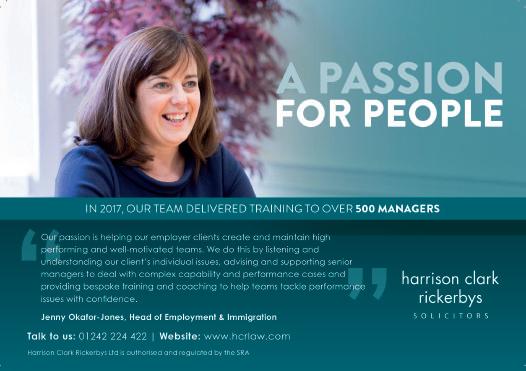


A distributor of floor covering products, Carpet & Flooring Limited based at Redditch, has secured a £15 million asset-based lending facility from Secure Trust Bank Commercial Finance to support strategic acquisitions.
The business has 11 branches nationwide, including Manchester, Birmingham and Bristol. It was acquired in February 2017 from SIG plc by private equity investor Endless which specialises in acquiring non-core assets from larger corporates.
The new funding will enable the business to pursue strategic acquisitions and support new branch openings.
Lisa Tomlin, Carpet & Flooring CEO, said: “The business is now in an excellent position and we’re pleased to be working with Secure Trust Bank on the next phase of our plan.”
Private investment of £750,000 has been secured for a world-class performing arts and music facility just weeks after planning was secured and before the formal funding process to raise £5 million has started.

The purpose-built educational building has been designed by Worcester-based One Creative Environments Ltd. The project is being privately funded, meaning that Christopher Whitehead Language College (CWLC) and Sixth Form in Worcester will be the only state school in the country to have such facilities on site.
One Creative Environments has provided the master planning, architecture, landscape architecture, structural and civil engineering and building should start during 2019.
The building was inspired by the movement of dance and how a dancer can be held effortlessly in the air.
In this design, the weight of the bells are disguised in an elegant bell tower structure that people walk underneath which has now become known as “the ballerina tower.”
The addition of the bell tower as an iconic entrance will also enable the teaching of bell-ringing which has educational benefits in the teaching of art, science and mathematics.
Neil Morris, Headteacher of Christopher Whitehead Language College and Sixth Form, said: “This entire performing arts centre will make an incredible difference to our students and the breadth of what we can offer through the curriculum.”
Siemens is to make a £27 million investment in a new manufacturing facility for Worcester-based Materials Solutions Ltd, its additive manufacturing 3D printing specialist.
The new building is set to open in September.
This represents a major investment by Siemens in this rapidly advancing
technology. The new factory will be based at the Worcester Six Business Park Development.
The expansion of the business is expected to support the creation of around 55 high quality new jobs. This will increase Materials Solutions’ team of engineers, metallurgists and manufacturing specialists to 80, making it a global centre of excellence. The new facility will also be a focal point for collaboration between Materials Solutions and the already sizable UK Siemens Digital Factory division.
Materials Solutions also offers engineering and printing to manufacture parts for the aviation and automotive industries, power generation and motor sports.
Siemens acquired an 85 per cent stake in Materials Solutions Ltd in 2016. The business is a pioneer in the use of Selective Laser Melting (SLM) technology for the manufacture of high-performance metal parts and has grown its business considerably over the last two years.
The 72 hectare Worcester Six Business Park sits right next to junction 6 of the M5. It has outline planning consent for 1,500,000 sq ft of manufacturing, offices, R&B and logistics buildings. Last year medical manufacturer Kimal confirmed it would locate its new headquarters at the site after securing planning permission.



As one of the UK's largest apprenticeship providers, WCG are experts in making them work for employers.
WCG Apprenticeships have expert knowledge, extensive industry links and fantastic facilities at Rugby, Warwick Trident and Evesham colleges.
Currently working with Jaguar Land Rover, BT Fleet, Cummins Engines, Greenmech, Downhurst Engineering and more…
We are taking the long term view that it is important to invest in the skills for the future of our company. Apprenticeships enable us to recruit people with the right attitude and enthusiasm, who want to get ahead – after a couple of years, we have a member of staff who is exactly trained to our requirements.
Winner of Training Provider of the Year 2017 at the Coventry & Warwickshire Apprentice of the Year Awards

Emily Halderthay was appointed CEO in the UK and Ireland of Schoolzine after meeting Phil Reardon, the founder of Schoolzine, Down Under.
Schoolzine is a digital communications platform for schools which provides e-newsletters, websites, apps, online booking forms and a parent/teacher booking system to communicate with parents at more than 1,000 schools in 19 countries across the world. It can also be translated into different languages.
The five-strong UK team is based at Venture House, Stratford-on-Avon.
Emily said: “I lived in Australia with my family for over three years. I met Phil who was looking to expand into the UK as we
“I lived in Australia with my family for over three years. I had a chance meeting with Phil who was looking to expand into the UK as we were planning to return here”
were planning to return here,” she said.
“We had funding from the Australian government because the newsletters we work on for our UK clients are designed and built by staff on the Sunshine Coast in Queensland.
“The Australian government wants to encourage commerce in coastal areas to keep people from leaving to go and work in the cities.”

Hundreds of Warwickshire businesses rocked the Ricoh at a major trade expo.

More than 600 businesspeople attended the Coventry and Warwickshire Chamber of Commerce’s CWRocks trade expo, making the most of one of the biggest networking opportunities in the area.

It was also a chance to hear from experts on topics such as Brexit and UK City of Culture during the Learning Labs.
Chris Nagle, the Events & Marketing Manager at the Coventry and Warwickshire Chamber of Commerce, said: “The great thing about the expo is seeing businesspeople meeting and either connecting for the first time or chatting to existing contacts.
“In this digital age, people still do business with people and there is nothing like meeting face to face in this way to keep the wheels of commerce in motion.”
A 10K off-road run featuring a series of man-made and natural obstacles is looking for a new home after September.
The Wolf Run (which stands for woods, obstacles, lakes and fields) has taken place at Welsh Road Farm near Leamington Spa since 2011 but will be cut in half by the high-speed train project (HS2).
The Wolf Run is organised by Charlie Moreton and Karen Archer of Lionheart Events, which creates and manages every kind of outdoor event.
Charlie said: “Our 2018 April and September events in Warwickshire are going ahead. However, they will be the last before moving to a new site.
“We see this as an opportunity for new and exciting events but the whole team here are upset to lose our home turf and such an iconic wild running venue.”
The search is on for the best possible venue in the Midlands region to replace Welsh Road Farm in 2019 and beyond.
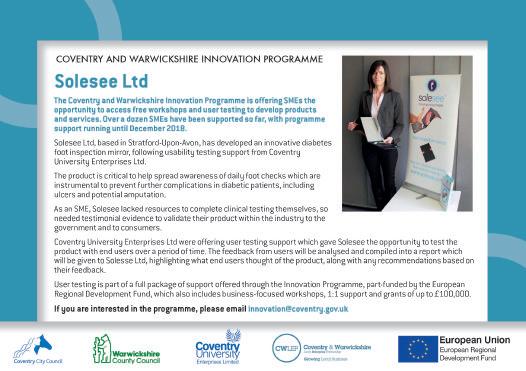

Data systems might not be considered by many as a priority for small breweries concentrating on brewing consistently great beer.
But when Purity, named 2018 brewery of the year by The Good Pub Guide, experienced a boom in sales, the team wanted to balance beer production with growing customer demand.
The company turned to WMG (Warwick Manufacturing Group) at the University of Warwick to help develop data systems to manage this complex operation while they got on with brewing the beer.

Andrew Thurston, Finance Director at Purity Brewing said: “The new production tool will save us money and support Purity with its rapid growth.”
Purity Brewing benefitted from collaborative project support through WMG’s Group’s Product Innovation Accelerator Project, part-funded by the European Regional Development Fund. This helps manufacturing SMEs within Coventry and Warwickshire to create, test and develop new products, improve processes and access innovation support.
Business & Innovation Magazine is delighted to be official media partners for the 2018 National Manufacturing & Supply Chain Expo.
The 2018 Expo is being held in the Ricoh Arena, Coventry on June 26.
Dr Daniel Peavoy, Innovation Manager, at WMG said: “We worked with Purity’s production manager to create a database to hold their production and warehouse data. We devised a set of tailored queries and a means of employing data analytics to forecast future demand and schedule the required production.”
Purity’s database can now be integrated into its IT and office systems. The new automated data transfer system will save Purity one day of effort per fortnight. The improved demand forecasting will also reduce the risk of incorrect deliveries and give more time to deliver continued quality to their consumer base.
A company which relocated to Warwickshire from Argentina has received a grant from the Coventry & Warwickshire Innovation Programme to develop its latest self-driving autonomous vehicle.
Baro Vehicles, based at Mira Industrial Park in Nuneaton, designs and produces connected and autonomous compact vehicles. It has received funding support to further develop the groundbreaking project, Baro One.
Baro One is a sophisticated engineered vehicle designed to transport people in private spaces such as university campuses, business parks and golf courses.

The new vehicle replaces the steering wheel with a joystick.
Baro has developed its own artificial intelligence software enabling the vehicle to learn from experiences which it can apply to the next journey.
The grant will be used to produce 10 prototypes. It will also help source expertise to complete the company’s human interface machine.
Baro Chief Executive Gabriel Giani Moreno said: “When we arrived in this incredible country, the county council opened all the doors and encouraged
It will feature an impressive line-up of manufacturing leaders, academics and government agencies delivering key-note addresses and debates. The conference will showcase innovative approaches and share new research.
Manufacturers from across the country are expectd to gather to challenge political decision makers to deliver a business environment which manufacturing deserves.
Delegates have registered from leading food, pharmaceutical, medical, chemical, electronics and engineering manufacturing sectors.
To register, visit www.manufacturingevent.co.uk
us. They told us ‘Do what you know how to do’ and here we are, working hard to achieve it.”
The Coventry & Warwickshire Innovation Programme, partly funded by the European Regional Development Fund, supports local SMEs to develop innovative products or services that will be new to the market.

Business start-ups including social enterprises and innovation projects were awarded a total of £36,000 at the Oxford Brookes Enterprise Support Awards.
The 8th West Oxfordshire Business Awards (WOBA) 2018 winners have been revealed.

Audley Travel, a bespoke travel company launched with money raised from a small car loan combined with its founder’s passion for Vietnam, was named the STL Communications West Oxfordshire Business of the Year 2018. (Read our interview on leadership with Audley Travel’s founder, Craig Burkinshaw, on page 69).
WOBA judges said the company deserved recognition for its strong and flexible leadership, impressive business growth and for becoming a major employer in West Oxfordshire with more than 300 staff at its head office in Witney with a further 400 employees split between its London and Boston offices.
“The WOBAs celebrate and connect over 8,000 businesses in the area and give large and small businesses the opportunity to gain local recognition and shout about their work”
Other winners included Manor Cottages for the Huffkins Hospitality, Leisure & Tourism Award, Safety Services UK for the Owen Mumford Innovation Awards and Aston & James for the MGroup Employer of the Year Award. The Retail award went to Sassi and New Business was won by Tickittyshake. The Business Person of the Year award went to Sheena Marsh of Oxford Garden Design.
Abingdon-based Sophos, a global leader in network security, has won the Innovation in Technology award at the PLC Awards. Sophos is the first company in the PLC’s 32-year history to win the top honours in successive years. The award acknowledges Sophos’ focus on innovation in next-generation network security to drive growth and market success.
The PLC Awards were extended to offer recognition to all publicly quoted
companies on the main market, from fledging indices through to FTSE 100, for their success and outstanding achievements throughout the year.
“It is fantastic recognition for our mission to bring next-generation security technologies to market,” said Nick Bray, Chief Financial Officer at Sophos. “Hackers are constantly evolving their attack methods and we must stay more than a step ahead in our product innovation.”
More than 60 students, recent graduates and staff pitched for funding and mentoring opportunities from entrepreneurs across Oxfordshire.
Ideas ranged from selling bright, waxedcotton trousers and promoting African culture to community-based apps and support for elderly people and carers.
Louise Wheeler, Founder Director at Research Oxford was on the judging panel. She said: “The quality of ideas and presentations was impressive. It’s fantastic to think the future of business in this country and around the world is in the hands of these inspirational entrepreneurs.”
“The quality of ideas and presentations was impressive. It’s fantastic to think the future of business in this country and around the world is in the hands of these inspirational entrepreneurs”
Student Kevin Pareiso and business partner Anina Tietjens won £500 for Dolkreyland, which will produce and sell African patterned trousers and promote African culture by including information about the story behind the pattern.
Lydiah Igweh, Brookes Enterprise Support Manager, said: “This was our most successful and inspirational Enterprise Support Awards to date – not just in terms of the number of applications received, but in the amount of funding and support and the quality of the ideas and pitches. In total, 34 businesses won funding.”

Automotive suspension company
Nitron which boasts Lotus and TVR as customers, has purchased new premises at Eynsham using a £280,000 commercial mortgage from HSBC.
Nitron develops and manufactures road and track suspension for high performance race teams and manufacturers, supplying more than 200 Nitron dealers across Europe, Asia, the US and Australasia.
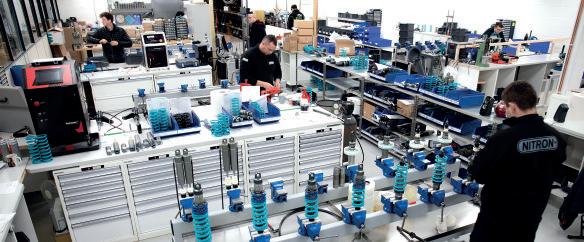
Owner Guy Evans was struggling to find a mid-size property locally for Nitron to move to when the company’s lease ended
towards the end of last year. He wanted to stay in the area to keep his 24-strong team, many have been with the company since it began and have developed specialist skills through their work with highly intricate components.
Guy eventually found a derelict building for sale in Eynsham, five miles from the company’s rented premises.
He said: “We’re excited to be in and have already secured new contract wins. Owning our premises rather than renting means we can start installing our hydraulic
Rural broadband specialist Gigaclear has awarded international fibre-optic products and advanced installation company, Lite Access Technologies, the contract to bring fast fibre broadband to more than 10,000 properties to some of the most rural parts of West Oxfordshire.
Lite Access will carry out all the civil engineering work and installation.
The build is looking to commence in the Langford and Great Tew areas in the coming months, with the full roll-out by the end of 2019.
Brett Shepherd, Chief Operating Officer, for Gigaclear said: “Due to their experience deploying similar projects throughout rural Canada, Lite Access Technologies is the ideal partner for Gigaclear.
“Due to their experience deploying similar projects throughout rural Canada, Lite Access Technologies is the ideal partner for Gigaclear”
“We’re excited to be in and have already secured new contract wins. Owning our premises rather than renting means we can start installing our hydraulic test machines which we couldn’t do in our last place”
test machines which we couldn’t do in our last place. We can also improve our product supply and with such a sizeable site there’s plenty of room for growth.
Edgars, the Oxfordshire-based planning consultancy, has celebrated 10 years in business and a move to The Old Bank, Witney.
The first phase of the project is a jointly funded £8 million plan to bring full fibre to 4,600 properties. Gigaclear is also investing a further £8 million to connect another 5,700 homes and businesses in the area, linking existing networks together and extending the provider’s already significant footprint in the district.
Edgars has been run as a planning consultancy by Jayne Norris since 2007 when she started it up from her kitchen table. Using her 30 years’ planning experience, including 20 years working in local government at the South and West Oxfordshire District Councils, Edgars has seen year-on-year growth with a 50 per cent increase in turnover in the last year. It is now a 10-strong team of planners working across a range of projects, including colleges and schools such as Radley College and Marlborough College, developers and estates including Great Tew Estate and Heythrop Park.
Employment Partner at Royds Withy

Having effective leaders can make the difference between a successful business with an engaged workforce and a business which struggles to achieve its goals or retain its talent.
Too often, businesses and individuals view those with the title of manager as automatically having leadership qualities. An effective leader is someone who is able to influence and inspire others on the basis of being trusted and respected. It is not just someone who happens to have a particular title or the authority to direct a particular course of action.
Managers are likely to need leadership skills, but the title alone does not provide them with this.
A manager will have responsibility for achieving particular goals, whether that be a project or a particular task, and to reach those goals they are likely to have to involve and manage others. However, although co-ordinating work and delegating tasks may be managing the project, it does not mean that the person is necessary leading the team.
From a business perspective, the key trap that many organisations fall into is to promote employees into managerial roles because they are good at their technical function and then expect them to also be excellent leaders or people managers.
As an employment lawyer, I am regularly asked to advise businesses about how to deal with poor performing managers who have been promoted into leadership roles

simply because it was the next logical step from the role they were in. Although career progression is an important part of talent attraction and retention, promoting someone into a role for which they do not have the requisite skills is damaging for the business, the employee in question and other staff members.
“Employees need to be supported in developing their leadership skills in the same way as they are with their technical skills. Training in communication, teamwork, delegation, and other leadership qualities should be built into internal development programmes and employees given time to progress in these areas rather than being expected to become successful leaders overnight.”
Employees need to be supported in developing their leadership skills in the same way as they are with their technical skills. Training in communication, teamwork, delegation, and other leadership qualities should be built into internal development programmes and employees given time to progress in these areas rather than being expected to become successful leaders overnight.
Key steps a business should take to attractand develop effective leaders include:
Identifying the right people for
leadership roles – the best performer in a particular function is not necessarily the person who will be the best leader or manager. Businesses should look for people who have good communication skills, are trusted and respected by others and who are able to motivate and lead others through difficult situations and times of change.
Providing coaching and training on “soft skills” – such as communication, leadership and people management.
For more information contact:
Kate
BeneferPartner, Employment T: 01865 792300
kate.benefer@roydswithyking.com
Targeting leadership development when it is needed – too often the support is provided as part of a performance process rather than prior to the employee taking up a leadership role. www.roydswithyking.com
Kate Benefer,
King in Oxford looks at how to develop and train your business leaders and what successful business leaders look like.

An 11-year-old boy from Botley who is rapidly rising up the Motocross ranks and regularly competes in front of thousands of people, has caught the attention of Oxford Innovation following his entrepreneurial plea for sponsorship.
Kyron Carron wrote to more than 40 Oxfordshire businesses to offer sponsorship opportunities with him, but only Oxford Innovation agreed to support Kyron and his family to help keep his dreams alive.
The company is donating £500 to help pay towards Kyron’s training, race fees and travel expenses.
Kyron said: “It means the world to me that Oxford Innovation took time to read and
answer my email, which is very nice as no other company has.”
Kyron has the support of his family who dedicate their time and resources to bike maintenance, race fees and travel expenses, but further financial assistance is needed to enable Kyron to continue competing at a high level.
Jo Willett, Managing Director, Oxford Innovation said: “Kyron wrote to us a
Chalgrove-based The White Rabbit Pizza Company has secured increased distribution of its award-winning glutenfree pizza range in Sainsbury’s stores.
Last summer, The White Rabbit Pizza Co was the first to launch a chilled vegan pizza in any UK supermarket when its Smokin’ Vegan hit shelves. The company now offers six varieties of gluten-free pizza, some of which are also vegan and dairy-free.
The White Rabbit Pizza Co was set up in 2013 by friends Josh Ogle, Nick Croft-Simon and Matteo Ferrari.

Friends Josh and Nick were working as barmen at The White Rabbit Pub in Oxford after graduating from university. Matteo was working in the pub’s kitchen having moved from his home city of Bergamo to finish his degree.
Thanks to Matteo’s family recipes, The White Rabbit was voted the best pizza restaurant in Oxfordshire.
When the pub started receiving requests for gluten-free varieties of Matteo’s pizzas the men seized the opportunity to launch their own business.
while ago asking for support, and we were all moved by his passion, dedication and politeness – all qualities we hope to see in the entrepreneurs we support.
“There are a lot of parallels between top sports and business people, so it seemed appropriate to try and do what we could to help and encourage Kyron to carry on. I hope other companies can dig deep to allow this dedicated young man to fulfil his potential.”
Regional Round-up
Business telephony and communications company STL Communications Limited has acquired SolveIT Solutions Limited which offers IT installation and support.
Brendon Cross, Managing Director of STL said: “We are now able to offer our customers the complete desktop experience together with supporting voice and data services such as leased lines, Wi-Fi and mobiles.”
Paul Govier, Managing Director of SolveIT said: ‘This opportunity to join forces means that we can provide our customers with a more comprehensive level of support and service because of the existing STL infrastructure.” Both STL and SolveIT are based in Witney.
Up to 100 leading business figures will sleep rough within the grounds of Gloucester Rugby Club on World Homeless Day in October. Gloucestershire charity Caring for Communities and People (CCP) is hosting SleepOut, challenging each participant to raise at least £1,000 to sleep rough and go to work the next day as normal, in the same clothes.
Cordell Ray, Chief Executive of CCP, said: “We plan to highlight the plight of the homeless and offer just a taste of what it is like to have to sleep rough.”
David Owen, Chief Executive of GFirst Local Enterprise Partnership has already signed up. “When CCP approached me I had no hesitation in agreeing to take part. Even one person being homeless is one too many.”
CCP is keen to hear from businesses interested in sponsoring. In the buildup to SleepOut and World Homeless Day, CCP will also be looking to showcase the work other county organisations do to help the homeless.
After suffering a near-fatal heart attack while competing at a London triathlon in 2014, Bruton Knowles partner Scott Winnard, who lives near Tewkesbury, has fought back to fitness and been selected for the Great Britain squad in the Triathlon World Championships in July.

Scott, 50, who is celebrating 25 years at Bruton Knowles’s Gloucester office, is a veteran triathlete who has competed in national and international events including the Ironman World Championships held at Chattanooga in the USA.
Bruton Knowles is sponsoring Scott as he makes his competitive comeback at the championships, to be held in Fyn, Denmark.
The commercial property specialists will also sponsor Scott when he competes in the European Championships in Ibiza in October.
“It’s not just people who are unfit or overweight who are at risk – a heart
“It’s not just people who are unfit or overweight who are at risk – a heart attack can happen to anyone. I was fully fit when I competed in the London Triathlon in 2014 – but suffered a stress related heart attack during the event”
attack can happen to anyone. I was fully fit when I competed in the London Triathlon in 2014 – but suffered a stress-related heart attack during the event,” says Scott.
A change in training regime, diet and prescribed drugs to counter high blood pressure helped him bounce back to fitness.
Scott will now be competing as part of the GBR team along with his partner Claudia Wilesmith.
They are both members of Tewkesbury Triathlon Club.

Children from Bourton-on-the-Water Primary School were the first in the county to try out the attractions at Greystones, a new education centre run by Gloucestershire Wildlife Trust.
The Trust has been renovating Greystones, a former derelict farm, into a centre of excellence offering education sessions, walking trails, a nature reserve, working dairy farm and a café. Greystones will be fully open to the public in the summer.
Thanks to a donation of £150,000 from Grundon Waste Management, a family business which helps companies divert waste from landfill for recycling, the barn
(which originally stored harvested crops), now features digital and traditional activities for visitors to enjoy.
“We are delighted to support Greystones, a remarkable project encouraging children to discover local wildlife, history and farming,” said Chairman Norman Grundon. “Inspiring children to enjoy
Following the success of the Local Business Charity Awards in Gloucestershire, the programme has been launched in Oxfordshire, sponsored by insurance specialists A-Plan and Jelf.

The awards recognise the contribution made by businesses to charities and entries are now open for Oxfordshire charities to nominate a local business which they feel has gone above and beyond to support them.
The winning business will win either the Jelf Award or the A-Plan Award and the winning charities will receive £1,000.
Judges will be looking for the effect the company’s involvement has had on the charity; the extent it has taken the charity to the employee’s hearts and how creative the company has been.
There will also be an Individual Award with the prize of a £300 weekend away, presented to a single person from an Oxfordshire business who has gone ‘over and above’ for the charity.
Louise Bruce of Big Red Box PR which organises the awards, said: “In previous years we’ve spoken to local charities which receive no help from local businesses and don’t have the advertising budgets or time to ask for it. We also know that local businesses would be willing to help but are worried that commiting to supporting a charity means raising thousands of pounds or running in marathons, something they simply don’t have the time or staff to do. We’re here to tell them this isn’t the case.
“Supporting a charity doesn’t need to be about financial support. For a small charity an afternoon being trained on using a
the excitement of the natural world is an important part of their education.”
Greystones is located within the Cotswolds Area of Outstanding Natural Beauty. It is a Site of Special Scientific Interest for its wildflower hay meadows and a Scheduled Ancient Monument for its Neolithic and Iron Age features.
specific software to handle their accounts, how to manage their social media accounts or letting them use a boardroom to hold an important meeting is just as valuable.”
Louise explains that the campaign ‘Support A Local Charity’ is like internet dating but for charities and businesses. Charities list themselves on the website, letting businesses know what they need and companies show what they can share. Each looks for the perfect match and gets in touch.
www.localbusinesscharityawards.co.uk

MAY
British Asparagus Festival

April 23–June 21
Vale of Evesham, Worcestershire
Worcestershire is often acknowledged as having ideal conditions for growing asparagus and many believe it’s where the best English asparagus is grown.
Numerous events and activities will take place during this two-month long festival that honours the growing, harvesting and eating of this sumptuous delicacy. Now in its 10th year, the British Asparagus Festival has grown bigger and better every year.
Cheltenham Cocktail Week
May 15-21
Regent Street, Cheltenham GL50 1HN
The town’s best-loved bars, pubs, clubs and restaurants come together to celebrate the joy of cocktails.

Witney Food Festival
May 19
St Mary’s Church, Witney OX28 4AW
Witney Festival of Food and Drink has grown so popular that within two years of the first festival, every available inch of St Mary’s and the surrounding area was filled.


The South Glos Food and Drink Festival


May 19-20
Bristol & Bath Science Park, Emersons Green BS16 7FR
Hosted on the lawns of the Bristol & Bath Science Park, satisfy that rumbling tummy from sweet treats to savoury delights and classic real ale to cocktail o’clock. This is free to enter and there will be something for everyone.
Blenheim Palace Food Festival
May 26-28
Blenheim Palace, Woodstock OX20 1PP
Regional food and drink from 130 stallholders, including artisan bakers, craft brewers, gourmet burgers, international food, traditional ice creams and handmade sweets.
Warwick Food Festival
May 27
Market Place, Warwick, CV34 4SA
A mouth-watering line-up of around 80
food and drink traders, live entertainment and kids’ activities, along with local chefs showcasing the best of the town’s culinary offerings in the Live Cookery Theatre.
Great Malvern Food Festival
May 28
In the grounds of Great Malvern Priory Church, Malvern WR14 2AY
A great weekend of food-themed activities taking place in the fantastic Malvern Hills. More than 60 stalls of locally-produced food, drink and crafts.
JUNE
Worcester Food Festival
June 8-10
Worcester City Centre
Around 60 stalls offering food and drink from local businesses and selected specialist producers. Food and drink matching sessions, cookery demonstrations and master class workshops by top chefs.
Cheltenham Food and Drink Festival
June 15-17
Montpellier Gardens, Cheltenham, GL50 1UL
From wine and food talks to entertainment, Cheltenham Food and Drink Festival has it all.
Abandon your kitchen this summer. There’s far too much foodie stuff going on across our region to ignore. We look at the region’s best food and drink festivals

Droitwich Spa Food and Drink Festival

June 16-17
Lido Park Droitwich, WR9 8AA
100 exhibitors and 15,000 visitors expected. Food Celebrity Steven BaileyCarter, finalist of the Great British Bake Off 2017, will open the event and provide a food demonstration.
Abingdon Food & Drink Festival
June 23
Rye Farm Meadow, Abingdon OX14 3HY
Organised by the Rotary Club of Abingdon Vesper, the Abingdon Food & Drink Festival returns to its fantastic riverside location.

Tewkesbury Food & Drink Festival
June 24-25
Tewkesbury Abbey grounds, Tewkesbury, GL20 5PG
Held in the stunning grounds of Tewkesbury Abbey. Highlights include a food and drink marquee with 60 stalls offering local produce, including a cookery theatre with live demonstrations from local chefs.
JULY
The Cotswold Show & Food Festival 2018

July 7-8
Cirencester Park, GL7 1XB
Billed as the perfect family day out. We’ll eat and drink to that.
Stratford Beer Festival
July 6-7
Stratford-on-Avon Racecourse, Warwickshire, CV37 9SE
The organisers are planning to offer more than 70 Beers and 30 ciders and perries but they warn that although the festival is planned to be open during Friday & Saturday, it will only be open until the drinks run out.
Cotswold Beer Festival
July 20-22
Postlip Tithe Barn, near Winchcombe GL54 5AQ
A festival of real ale and real food. For 42 years CAMRA has been celebrating the very best in ale and cider, at Postlip Tithe Barn, a venue as real and authentic as the beverages, they say.
The Cheese and Chilli Festival
August 4-5
Sandford Park, Cheltenham GL52 6HP
With an obvious focus on cheese and chilli, organisers promise there will be something for everyone at the event including free activities for children and adults.
Oxford Foodies Festival
August 25-27
Oxford South Parks, Oxfordshire OX1 3RG
Watch Great British Bake Off stars baking live. Meet Michelin-starred chefs, Great British Menu winners, Masterchef champions and top local chefs baking, cooking and presenting.
The Big Feastival
August 24-26
Churchill Heath Farm, Kingham, Chipping Norton OX7 6UJ
A summer festival for all the family, combining top class food with live music from some top bands on Alex James’ farm.
Leamington Food & Drink Festival

September 8-9
The Royal Pump Gardens, Leamington Spa, CV32 4AA
More than 150 exhibitors, live entertainment, cookery demonstration and kids’ cookery school.
Newent Onion Fayre
September 8
Newent Town Centre, GL18 1QE
From fresh local food and produce through to beers, wines, ciders and juice, there’s a lot more than just onions.

Innovate UK has announced new funding and support for women through a second round of its female-only competition after it announced that boosting female entrepreneurship could add around £180 billion to the UK economy. The programme will launch later this year.
Alongside this, Innovate UK will run quarterly innovation accelerator workshops to help get more women innovating in business nationwide.
Last year Fanzi Down, Director at Forest of Dean-based DPS Designs was identified by Innovate UK as one of its top women in innovation. Fanzi grew up in China and moved to the UK at 16. She is now working on chocolate moulding techniques by industrialising the process of displacement moulding.

The second Women in Innovation competition will seek ideas that address the four grand challenges posed by the government’s Industrial Strategy. These are: artificial intelligence and the data economy, clean growth, future of mobility and the ageing society.
The first Women in Innovation programme was launched in 2016, following research that found just one in seven applications for Innovate UK funding came from women.
Since the programme launched there has been a 10 per cent increase in female registrations for Innovate UK support.
Speaking at a special Women in Innovation event in London to celebrate International
Women’s Day, Dr Ruth McKernan CBE, Chief Executive of Innovate UK, said: “Our 2018 Women in Innovation programme is designed to help more women achieve their business ambitions and harness the full talent pool.”
Speaking exclusively to Business & Innovation Magazine, Dr McKernan added: “We commissioned a survey to find out what is holding women back. Feedback included lack of confidence, lack of role models and asking for less money. But there was a lot in the survey about wanting support and having ambition.”
“Our 2018 Women in Innovation programme is designed to help more women achieve their business ambitions and harness the full talent pool”
One piece of advice she offers to women is to be prepared. “If you are in a meeting and you are a woman, ask the first question. Be confident of your facts. Be the best prepared person in the meeting.
“It’s also a good idea to challenge anyone who overstates their position, especially when you know it. You should establish early that people who can’t justify what they are saying won’t get away with it.”
“It’s entirely reasonable to ask for evidence when a person overstates their case or makes something up on the fly. They might say ‘I read such-and-such last week’ – ask them to substantiate it.
The 26-year-old boss of a digital services company has made the Forbes Europe ‘30 Under 30’ list as his company is identified as one of the UK’s 50 fastest-growing technology companies.

Marcus Taylor, CEO and co-founder of Wallingford-based Venture Harbour has been included in the 2018 edition. This follows him being included in this magazine’s Talent list, published in January.
The digital innovation studio has expanded into a globally-distributed team of more than 20 since setting up at Howbery Business Park near Wallingford.
Venture Harbour has built nine ventures so far, ranging from lead generation software to artificial intelligence chatbots.
A software service that helps capture more leads is Venture Harbour’s most successful to date. Called Leadformly, it is now used by brands across the world.
Marcus said: “It’s fantastic to be recognised by Forbes. I’m really proud that we are now one of the 50 fastest growing tech companies in the UK.”
They are likely to go quiet for the rest of the meeting.”
International Women’s Day is a collective day of global celebration and a call for gender parity. No one government, NGO, charity, corporation, academic institution, women’s network or media hub is solely responsible for the event.

A 130-year old golf club near Stroud is undergoing major improvement works after securing a £500,000 finance package from HSBC.

A Bromsgrove stainless steel business has secured its head office site and bought new machinery thanks to the support of a £1.8 million funding package from Lloyds Bank Commercial Banking.
UKF Group manufactures steel products across four operating divisions that include UKF Stainless, The Joint Perforating Company (JPC), Ferrari Stainless & Alloys and Stainless Metal & Alloys.
The business has a strong client base in the UK and Europe, particularly with automotive companies and domestic appliance manufacturers.
The Group recently secured a £1.35 million loan from Lloyds Bank to buy its rented site on Buntsford Park Road. This helped the business to focus on further investment and growth.
UKF Group has also received a £450,000 asset finance facility from Lloyds Bank to buy a new laser cutting machine. The business can now expand its product
offering to customers without impacting day-to-day cashflow.
Phil Morris, Group Chairman at UKF Group, said: “Purchasing our premises in Bromsgrove has given us the financial headspace to focus on our growth.”
Grant Warren, Relationship Director at Lloyds Bank Commercial Banking, said: “Specialist manufacturers like UKF Group are flying the flag for businesses in the Midlands and playing their part in boosting the local economy.”
Minchinhampton Golf Club, which has three courses, two clubhouses and top practice facilities, has used some of the funding to purchase and install new course equipment.
The club also plans to upgrade the bar area, including building a balcony and increasing car parking spaces.
Christopher Fisher, Treasurer at Minchinhampton Golf Club, said: “With the funding in place, we can continue to maintain the club’s high standards and improve our facilities.”
Minchinhampton Golf Club is a host venue for The Open regional qualifying series 2018-2022. It previously hosted the event between 2002 and 2007.

Gloucester-based Ecclesiastical has been named as the top home insurer by Fairer Finance for the seventh time in a row.
The specialist insurer topped the Fairer Finance Spring 2018 Home Insurance table, above 46 other insurers including Aviva, John Lewis, Hiscox and NFU Mutual.
Ecclesiastical also ranked first for customer happiness and customer trust category.
The independent consumer group surveys around 23,000 UK banking and insurance customers twice a year, asking them to rate how satisfied they are with their bank or insurance company in four key areas; happiness, trust, complaints handling and transparency.
Mark Hews, Group Chief Executive of Ecclesiastical Insurance, said: “I am delighted that Ecclesiastical has once again been named as the best home insurer by Fairer Finance. It’s particularly pleasing
that customers have put us top of the table for the seventh successive time and a long way ahead of the best of the rest for customer trust and happiness.
“Ecclesiastical is a different kind of business. Our charitable ownership means we can focus on doing the right thing, without conflict between customer and shareholder or owner interests, and our approach motivates us to care more about who and what we insure.”
Ecclesiastical named best home insurer again Legal & Financial
“Specialist manufacturers like UKF Group are flying the flag for businesses in the Midlands and playing their part in boosting the local economy”Lauro Rodi (Lloyds Bank), Phil Morris (UKF) and Grant Warren (Lloyds) Minchinhampton Golf Club

A new cyber networking group has been set up in Worcestershire, spearheaded by FinditinWorcestershire, which connects county businesses.
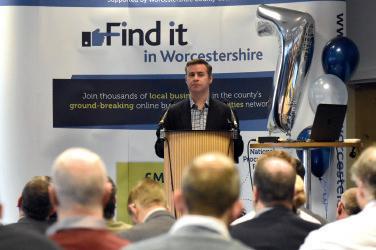
The inaugural cyber breakfast meeting was held at Sixways Stadium. Hosted by Steve Borwell-Fox, Managing Director at Borwell Ltd, it was supported by Sutcliffe & Co Insurance Services, ISO Quality Services, Titania, West Midlands Regional Cyber Crime Unit.
The guest speaker was Phil Arch from The Morgan Motor Company.
Phil discussed how Morgan has improved its cyber credentials. The largest Britishowned motor manufacturer had two security breaches recently which forced it to relook at the way it handled supply chain data and general computer security.
He said: “Our first step was to contact the ‘Be Cyber Secure Programme’ for help, ensuring virus and malware protection was up to date and to get certified to a UK security standard.
“Our first step was to contact the ‘Be Cyber Secure Programme’ for help, ensuring virus and malware protection was up to date and to get certified to a UK security standard”
“We have a supply chain partner network in Worcestershire of around 150 companies, so it was vital to look at how we were handling sensitive data.
“As an integral part of our GDPR compliance, Cyber Essentials gave us a clear understanding of five key controls that can prevent the majority of cyber attacks.”
Lorna Jeynes, Project Manager at FinditinWorcestershire, said: “Cyber Essentials is an effective tool which can be built on to achieve greater security in organisations all across the county and is crucial for supply chains, as you are only as strong as your weakest link.”
Leaminton Spa-based cyber security company, Nettitude, has been sold to Lloyds Register, a global provider of professional services in engineering and technology.
Founded in 2003, Nettitude is an award-winning provider of cyber security, compliance, infrastructure and managed security services to organisations worldwide and employs 140 cyber security specialists globally.
The acquisition strengthens Lloyds Register’s existing broad portfolio of cyber security services.
Nettitude and Lloyds Register now provide a complete suite of cyber security assurance services to help clients identify, protect, detect, respond and recover from cyber threats.
Alastair Marsh, Chief Executive Officer, Lloyd’s Register, said:
“This is an important acquisition for Lloyd’s Register to enhance our capability in assuring the increasingly complex supply chains in which we operate. Information and operational technology security is a key concern for our clients across all sectors.”
BAE Systems, which has a base at Gloucester, has won a new contract with Hastings Direct, a fast-growing UK general insurance provider. The deal will see BAE Systems deploy its fraud detection solution NetReveal to help the company detect, investigate and prevent claim and policy fraud, while minimising the impact on genuine customers.
Mark O’Neill, Head of Insurance UK & Ireland, BAE Systems Applied Intelligence, said: “Around 10 million people use price comparison websites each year in the UK. They’re convenient but this makes it easy for potential fraudsters to manipulate their quotes and provide false information to obtain cover. Insurance providers like Hastings Direct require the ability to quickly process
vast amounts of data to detect any fraudulent applications. In order to keep up, insurers need to use technological advancements in fraud detection.
“We will help Hastings Direct find policy fraud and treat genuine claimants well using our predictive and behavioural analytics, social network analysis and machine learning.”
GBE Converge, headquartered in Gloucestershire, provide a comprehensive range of fire, security and IT Solutions across the UK. Martyn Smith the company’s joint Managing Director talks on why GBE Converge under the new brand, are developing the services the company is providing.
The strength of GBE Converge since the new brand launch:
The two companies already benefited from a long-standing and productive working relationship, so the merge has been a relatively seamless transition into one brand and organisation. Both companies share the same customer focussed philosophy and delivery of excellent levels of service and this is very much continuing. Through the integration of our services, we have strengthened and broadened what we can offer our customers and can now provide a genuine end-to-end service encompassing all aspects of Fire, Security and IT solutions, designed for the entire life-cycle of our customers’ building or facility. As an independent company, working only with established and reputable technology manufacturers, we will only recommend the most suitable solution for that project.
The GBE Converge range of services:
We cover the entire spectrum of a company’s IT, Fire and Security needs. For IT Solutions this means we have the expertise and knowledge to offer a range of services that includes IT infrastructure, Data and Hosted Services, Security and Disaster Recovery, IT Support and Structured Cabling. We also offer the ‘virtual IT manager’

particularly aimed at SMEs for future vision and strategy. Our Fire and Security services encompass design, supply, installation, commissioning and servicing of all Life Safety and Security systems that includes Fire Detection and Alarms, Fire Suppression, Public Address, Intruder Alarms, Access Control, CCTV, Extinguishers and emergency lighting. The GBE Converge After Sales and Maintenance (ASM) division offers a wide variety of planned preventative maintenance and reactive callout for all Fire and Life Safety, Security and Information Technology and Data Network Services, regardless of if we originally installed the systems. The ASM division prides itself on the high levels of excellent customer service it provides.
With such a broad range of services, our customers span a range of different industries and sectors throughout the UK. This means our breadth of knowledge and expertise is equally diverse! For example, in the education sector locally to Gloucester, we work with clients such as Gloucester Academy, Cheltenham College and Cleeve School as well as other educational establishments
throughout the country. In healthcare our clients include Great Ormond Street Hospital, Gloucestershire NHST and Birmingham Dental Hospital. Stadiums include Twickenham, Gloucester Rugby Club and the Ricoh Arena in Coventry. Our commercial projects have included the new U.S. Embassy, Café Royale, Robert Welch and the Kings Cross R7 and Gas Holders developments in London.
The merger of the two companies has put the final piece of the jigsaw into place. Our vision of being able to design, implement and support all IP Based solutions for customers is now a reality and we want to make sure our customers are fully aware of the excellent opportunity we can provide for them. We will continually develop the trusting longterm relationships we have built with our customers with an approach remains both cost effective and responsive.
If you would like any further information on GBE Converge and how we can support your business we’d be delighted to talk with you. Please contact sales@gbeconverge.com and one of our solutions team will help you.
Following the recent merger between GBE Fire and Security and Converge Technology, Gloucester’s GBE Converge are set for significant growth in the future…
Two Cheltenham-based cyber companies, Corvid and Ripjar, have been named among the UK’s most promising cyber security start-ups by industry magazine Techworld.
Corvid launched in 2013 born out of the cyber security department of Ultra Electronics, the FTSE 250 company which has a base at Cheltenham. Ultra Electronics specialises in providing smart electronics technology for the aerospace and defence industries.
The sensitive technologies being developed by Ultra Electronics were at particular risk of cyber attack, and traditional defences were insufficient to combat the evolving threats. The protection offered to Ultra Electronics was so successful that it was decided to make Corvid available as a commercial solution.
Ripjar is a data intelligence platform that can be used for a variety of tasks, including monitoring feeds such as social media for threats, customer and reputation management.
In early 2017 Ripjar received £3.75 million in follow-on funding from Winton Ventures, and since its founding has doubled its size in its Cheltenham and London offices.

Prime Minister Theresa May namechecked Ripjar in her speech in Davos in January. She said: “British-based companies such as Ripjar are pioneering the use of data science and artificial intelligence to protect companies from money laundering, fraud, cyber crime and terrorism.
In March Ripjar announced that former GCHQ director, Sir Iain Lobban has joined the company as Senior Advisor.
Oxford University’s data protection is much better than Cambridge’s, according to a leading cyber security firm.

As part of a campaign to raise awareness of hacked credentials, RepKnight scoured the dark web for stolen Oxbridge email addresses using its monitoring tool Breach Alert. The company found around 400,000 stolen addresses with the cam.ac.uk domain, more than double the number that feature the ox.ac.uk domain.
Patrick Martin, cyber security analyst at RepKnight, said: “It is often assumed that cyber criminals are primarily
A strategic meeting between the Director of Cheltenham-based GCHQ, Commander of the UK’s Joint Forces Command, and the Director of the US National Security Agency & Commander of US Cyber Command discussing the agencies’ partnership, has resulted in the issuing of a first joint statement, underlining US/UK solidarity.
The joint statement reinforced the partnership and shared history which will continue to be vital in protecting the UK and USA.
The statement said: “Our organisations work extremely closely together to help keep the United States and United Kingdom safe. Our discussions focused on how best we deploy and develop our
“It is often assumed that cyber criminals are primarily targeting commercial businesses. However, it’s not hard to see why the confidential data stored at universities might be a valuable commodity for criminals”
targeting commercial businesses. However, it’s not hard to see why the confidential data stored at universities might be a valuable commodity for criminals, given the links those institutions have to government agencies, supra-national organisations like the EU and the private sector.”
cyber capabilities to counter, and defend ourselves against, malign activity around the world.
“This co-operation has been part of our shared history for over 75 years and will continue to be vital in protecting our countries. Every day our brilliant people share information and ideas as they counter shared threats in an increasingly digital world. We thank them for everything that they do.”

The clock is ticking. If you’ve not rolled out plans for the General Data Protection Regulations (GDPR) then you’re leaving it quite late. Commercial lawyer at BPE Solicitors, Doris Woo, explains why the time to act has arrived

There have been (and no doubt will continue to be) a raft of updates from the Information Commissioner’s Office (ICO) and the details are finally falling into place. Questions are being answered, clarity delivered and with written evidence being submitted by charities, industry sectors, law firms and newspapers among others, the fine detail and mechanisms for implementing the requirements are becoming clear.
The more significant developments and clarifications of recent weeks and months have come in the areas of special category data, legitimate interest and its application for direct marketers, and the activities performed by organisations which will require a data protection impact assessment.
Special category data is information that relates to or identifies a data subject’s race, ethnic origin, politics, religion, membership of a trade union, genetics, biometrics (if used for ID purposes), health, sex life or sexual orientation.
In order to lawfully process special category data, you must have one of the six lawful bases for processing the data under Article 6 of the GDPR, as well as meeting one of 10 special category conditions specified in Article 9(2). However, the
legal basis and conditions do not have to be linked.
For some time, marketers have been seeking clarification on the use of “legitimate interest” as a legal basis for contacting prospects by direct marketing. The ICO has now updated its guide, which in summary states that this legal basis consists of the following elements:
Identify the legitimate interest, ie a legitimate interest must exist
The processing (eg a particular marketing activity) is necessary to achieve the legitimate interest
The processing (including frequency and method) is reasonably expected by the individual, given the existing relationship between your organisation and the individual
If you rely on legitimate interests as your legal basis for any processing activity, you must also include details of your legitimate interests in your privacy policy.
In a simplified example, “reasonable” could refer to sending weekly email offers to your previous customers, provided that the individual being marketed to has not previously opted out of such direct marketing activities. It could be argued that previous customers should reasonably expect to continue receiving these weekly offers. However, increasing the email
frequency from weekly to daily without any warning, explanation or justification may be regarded as intrusive, with the risk that the legitimate interest is likely to fail.
DPIAs are the successor to the Privacy Impact Assessment (PIA) under the Data Protection Act 1998 (DPA). While PIAs were not required under the DPA but merely recommended for any activity using personal data or impacting on individuals’ privacy, the ICO has set out a list of “high risk processing” scenarios which require a DPIA under the GDPR.
The full checklist can be found in the ICO’s published guidance, containing examples of activities requiring a privacy assessment not previously mentioned for PIAs, such as processing biometric and genetic data, collecting individuals’ personal data via a third party without providing them with a privacy policy (aka ‘invisible processing’), and the profiling of or targeting services at children.
The clock is ticking and the GDPR is coming. It applies to all businesses and the devil, as they say, is in the detail. Make sure your privacy policies are clear, your procedures are in place and you are prepared for May 25. If you aren’t, it’s not too late… but you need to act fast.










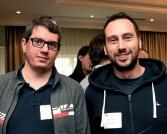
David Woodfine of Cyber Security Associates, James Hadley from Immersive Labs, Georgia Stewart, Co-founder of mobile savings and investment platform Hedge, Jack Chapman, from Cheltenham-based CyberShield which helps protect companies and their employees from opening deceptive emails and Alex Chalk, MP for Cheltenham spoke at the first CyNam event of 2018. Business & Innovation Magazine is the official media partner for CyNam. The substantial numbers attending every event show the value of Cheltenham’s cyber security organisation. www.cynam.org
PHOTOGRAPHY: ROB LACEY
Would you like to feature your business event, launch or party in our business events section?

Versarien plc, the Cheltenhamheadquartered advanced materials engineering group, has announced a new collaboration with professional cycling team Team Sky.

Versarien and Team Sky will collaborate to explore the benefits of adding graphene to high performance cycling equipment used by Team Sky. These products may include cycle frames, wheels and tyres, together with rider helmets and other riding apparel.
Carsten Jeppesen, Head of Technical Operations at Team Sky, said: “This collaboration with Versarien provides us with a unique opportunity to explore the application of new and emerging materials in high performance cycling.
“This collaboration with Versarien provides us with a unique opportunity to explore the application of new and emerging materials in high performance cycling”
Alongside our current performance partners we are developing a diverse network of innovation expertise across Britain and Europe to support our riders’ ambitions.”
Neill Ricketts, CEO of Versarien, added: “Elite sport is an ideal showcase for our graphene technology.”
Revenue has risen at Spirax Sarco Engineering, the multi-national industrial engineering group which has its headquarters in Cheltenham.
Revenue was close to £1 billion in 2017, up from £757 million in 2016, a rise of 32 per cent. The company’s pre-tax profit was £192.5 million.
Nicholas Anderson, Chief Executive, said: “I am very pleased with the results delivered in 2017 which again demonstrate
Manufacturing
Oxford Nanopore Technologies Ltd, the UK-based DNA sequencing technology company, will open a new 34,500 sq ft, high-tech manufacturing facility at Harwell, Oxfordshire.

This represents a significant increase in Oxford Nanopore’s manufacturing capabilities. The site will be used to manufacture and distribute the DNA/ RNA sequencing products in one purpose-built facility.
Dr Gordon Sanghera, Chief Executive of Oxford Nanopore Technologies said: “This facility reflects growing demand for our products across more than 70 countries. Building on existing facilities at Harwell, we will continue to be part of a unique ecosystem of people dedicated to science and innovation.
The company has also raised £100 million in new investment from global investors.
the robustness of our strategy and strong direct sales business model.”
The company made two major acquisitions last year. In April, it bought the German advanced industrial boiler systems company Gestra for £160 million. The following month it acquired USA-based electrical products company Chromalox for £319 million.

Nicholas added: “We increased investment in 2017 and during 2018 we will again
prioritise accelerating revenue and capital investments for growth over further margin expansion, to ensure that we continue delivering organic sales growth that outperforms our markets.”

When we talk about succession planning, invariably the focus is on family and shareholder succession. This tends to lead on to tax planning and ensuring that the correct documentation is in place.
But in some industries – manufacturing is a good example – there is the question of ‘experience’ succession.
The saying ‘no one is irreplaceable’ has some truth to it but losing someone with decades of experience in your company, products, services and culture, can leave a hole that is costly and time consuming to fill.
These are non-shareholder issues that require addressing in good time, otherwise they have the ability to create problems.
A business’s workforce is varied. It will include people with years of experience. They will have significant technical knowhow and a wealth of knowledge.
That instinctive understanding of how the business works and what is important to its success? You need to plan for it.
In the longer term, this involves identifying young managers coming through the ranks and mentoring and fostering them.
We know we have a skills issue across the UK and in attracting graduates and school leavers into the manufacturing industry. There is a big push on apprenticeships at the moment, and we are at the start of a government initiative involving the new ‘T Levels’.
The manufacturing sector in particular is struggling to find key staff because of skills shortages and an ageing workforce. Research reveals almost a million replacement workers will be needed in the manufacturing sector by 2020 and the problem is only likely to get worse.

Compared to other industries, proportionately more job vacancies in manufacturing are deemed hard to fill, and there is the risk of retirements, staff moving to competitors and even illness, which can create problems.
“Good succession planning means being able to react quickly and in an orderly fashion when the inevitable call comes that an experienced, valuable and valued member of your team is set to leave the business”
The manufacturing sector is not the only industry that has issues related to an ageing workforce, but it does have a particularly high number of workers in the 35-55 age range.
Larger companies may be able to attract new blood into their business, but there are not enough talented young people to even begin to replace the experience of some long-standing workers.
A retirement announcement can come as a bombshell if you haven’t given it prior consideration and can put the employer
in a difficult position. The ongoing skills drive will eventually see more people coming into the manufacturing industry, but this will take time.
Succession isn’t something that, on a day-to-day basis, is discussed in detail and management and board meetings rarely cover it.
At Crowe Clark Whitehill, we have been working with business leaders to talk specifically about key individuals within the organisations and help them plan for succession issues that could one day suddenly become an urgent matter.
Are you fully aware which roles carry the most risk for your organisation if you had to find a replacement at short notice?
Plans need to be put in place and this takes thought and time. You need to understand the experience employees hold and how this can be shared. Working with specialist advisors can help business owners look at the business from a unique perspective.
It is important to understand your emerging talent’s career aspirations.
Who has the potential to move into roles that hold the highest value to the business? What support and training do they need to make an orderly transition?
Good succession planning means being able to react quickly and in an orderly fashion when the inevitable call comes that an experienced, valuable and valued member of your team is set to leave the business.

World-leading manufacturing company Safran Landing Systems, based at Cheltenham, which designs and manufactures aircraft landing and braking systems, welcomed nearly 50 manufacturers and engineers to the first Business & Innovation Magazine Manufacturing Live.
The event was supported by national accountancy firm Crowe Clark Whitehill and BPE Solicitors.
Business & Innovation Magazine ‘Live’ events offer companies in key industry sectors unique opportunities to collaborate and participate in site visits across the region to share best practice.
Guests came from some of the region’s biggest manufacturing companies and research establishments.
Our first Manufacturing Live event at Safran was oversubscribed.
More than 50 manufacturers and engineers heard Chris Wilson, Safran Managing Director and Vice-President of Production, outline the success of the Cheltenhambased business, which employs more
than 1000 people. He also talked about the wider challenges across the sector which is seeing huge price pressures as travellers demand cheaper flights. The company’s manufacturing engineering manager, purchasing site leader and head of continuous improvement also gave presentations and answered questions.

Guests toured the huge facility, witnessing skilled engineers undertake the quench process in the heat treatment facility as part of the overall manufacturing and processing sequence of the landing gear.
Safran designs and manufactures aircraft landing and braking systems for large commercial aircraft, regional aircraft, business jet, military aircraft and helicopters. It also services and provides spares for the equipment.
The Cheltenham-based site invests in research and innovation to push the boundaries of landing and braking systems design in order to develop lighter, quieter, more cost-effective and robust systems.
The company is actively seeking to increase its UK supply chain. John Wedley, Safran’s Purchasing Site Leader, outlined the company’s supply chain challenges,
requirements and opportunities for potential new suppliers. “Our suppliers must have AS9100 quality (the aerospace standard based on the ISO 9001 quality system requirements) and need to have a turnover of more than £10 million to be able to meet Safran’s supplier requirements,” he said.
It can take years to meet Safran’s high supplier requirements. This was confirmed by Craig Peterson, the CEO
of Future Advanced Manufacturing, who attended Manufacturing Live. His company, also based in Cheltenham, finally met the supplier requirements after four years of planning and investment at the company.
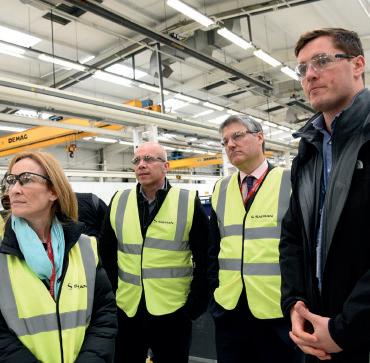
“It was a risk and a significant investment for us to meet Safran’s supplier demands,” he said. “But it’s been worth it. We are now working well with the company in a number of areas.”
Simon Bayliss, Safran’s Continuous Improvement Director, outlined the company’s strategy in empowering all its staff, which drives productivity across the entire factory along with a sense of pride in being part of cutting edge innovation and manufacturing.
The next Business & Innovation Magazine Manufacturing Live will take place later this year.

“It was a risk and a significant investment for us to meet Safran’s supplier demands. But it’s been worth it. We are now working well with the company in a number of areas”









Business & Innovation Magazine hosted our inaugural Manufacturing Live event at Safran Landing Systems, the aerospace world leader in the design, development, manufacture and support of landing gear systems. This invitation-only event forum included presentations on manufacturing challenges for Safran Landing System’s aircraft landing gear: materials & technologies, supply chain challenges and continuous improvement followed by a special conducted tour of the Safran Landing Systems manufacturing facility. The event was over subscribed and a second Manufacturing Live will be held later in 2018.
PHOTOGRAPHY: ROB LACEY





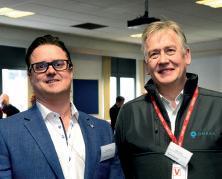





Gloucestershire College (GC) marked National Apprenticeship Week with a VIP ceremony at its Gloucester campus and a visit from Anne Milton MP, the Minister for Apprenticeships and Skills.
The Minister presented the college with an Association of Colleges Beacon Award for its successful apprenticeships programme, supported by Ian Munro, Area Director for the Association of Colleges.
The award judges were impressed by the success rates of GC’s apprenticeship provision, which is well above the national average, making it one of the leading providers in the South West. The college was also acknowledged for expanding its apprenticeship provision and work with local employers, the community, schools and business organisations.
Abingdon & Witney College has been recognised as the leading apprenticeship provider in the south of England at the inaugural Annual Apprenticeship Awards.
The awards took place at a reception at the House of Commons, sponsored by the chair of the education select committee Robert Halfon.

Di Batchelor, Principal at the college, said: “We can’t overstate the value of this kind of award and the recognition it brings to the college as a premier provider of high quality apprenticeships.”
Matthew Burgess, the college’s Principal and Chief Executive, said: “To be recognised nationally for our work in this area reflects not only the outstanding outcomes for the apprentices themselves, but also the impact on the employers’ businesses and the way that the College responds to employer needs in this area.”
Despite the number of apprenticeship starts being down 61 per cent nationally since the introduction of the apprenticeship levy, Gloucestershire College’s apprenticeship starts increased by 32 per cent, with an overall success rate of 84 per cent, well above the national average. Gloucestershire College works with more than 600 employers from small and medium sized businesses, to locally-based, global organisations.

A Coventry manufacturer has put 12 members of its team through an industry-leading training programme in order to continue delivering high standards for its automotive clients.
Sarginsons Industries, based at Torrington Avenue, is a world-leading lightweight casting company and many of its customers are premium car assemblers across the UK and Europe.
The company has invested heavily in machinery and technology in the past year and is also constantly training and upskilling staff at all levels.
As part of that, Sarginsons enlisted the help of the Society of Motor Manufacturers & Traders (SMMT) Industry Forum to deliver a training programme with current team leaders or those with the ability to step into those roles in the coming years.
The training programme included everything from Waste Elimination and QCD Data Collection & Analysis through to Structured Problem Solving and Communication and Leadership.
Improvements have already been seen in many areas.
Anthony Evans, Managing Director at Sarginsons, said: “We are committed to continuous improvement and that is why we are investing in technology and our people.
“It’s vital that our clients know that we are operating to the very highest standards and that is why we enlisted the support of SMMT Industry Forum to undertake this training programme.
“The team work tirelessly to ensure our apprentices and their employers are a good match, that businesses are getting the most from their Apprenticeship Levy and continue to promote apprenticeship opportunities across Oxfordshire.”
StarBistro, based at the National Star College, has appointed Ryan Harris as head chef. Ryan, who previously worked at the Forest House Hotel, Coleford, and recently as a chef assessor for training company Babcock International, is an experienced chef with a passion for simple, tasty food with a twist.



Oxford-based Royds Withy King has appointed two new partners. Emma Banister Dean has joined the Dispute Resolution team from professional services firm Knights, while Iain Butler has joined the Corporate & Commercial team from national law firm Shoosmiths.
Minette Batters has been elected as the new President of the National Farmers’ Union, based at Stoneleigh, Warwickshire Ms Batters, a beef farmer from Wiltshire, has been elected for a two-year term alongside Guy Smith as Deputy President and Stuart Roberts as Vice-President.


Harry Breakwell has been made an Associate in Gloucester-based Bruton Knowles’ Land Development team. Bruton Knowles partner and head of Land Development, Scott Winnard said the team played a vital role spearheading development opportunities across the region.

After three years as a specialist marketing recruiter, Sue Waters has now joined Mike Goode as a Director of GB Solutions, which is planning continued expansion across the south west.
The Royal Agricultural University at Cirencester has welcomed new Deputy Vice-Chancellor Lucy Meredith. Dr Meredith was previously Dean of Computing Engineering and Science at the University of South Wales. She is a leading environmental health academic with interests in environmental health, environmental microbiology, food safety and public health engineering.
After 35 years Jonathan Brew (above left) will step down as senior partner at Harrison Clark Rickerbys but boost his role in the community. Richard Knight will take over at Senior Partner. He said: “I want to engage with our seven offices, meet the teams and hear more about the work that colleagues do in and with their communities.”

Three new board members with expertise in business funding, strategy and digital marketing have been elected to the Board at BCRS Business Loans. Norman Price OBE, formerly Chair of the West Midlands Regional Finance Forum; Sukie Rapal, Head of Digital at The Midcounties Co-operative and Geoff Edge, Managing Director of Geonomics Ltd and former Chief Executive of West Midlands Enterprise Ltd are to join the eight strong Board to advise on the strategic direction of BCRS Business Loans.


Dove Construction the Gloucester-based construction business has announced the appointment of Adrian Davies as Managing Director. The company has also made a number of new appointments to its Board of Directors.
Mark Beard, FCIOB, chairman of construction group Beard, which has offices in Swindon and Oxford, will be appointed Vice-President of the Chartered Institute of Building (CIOB) in June. In 2020 Mark will become president of the CIOB. Mark has transformed the 126-yearold family-owned firm from an £18 million to £144 million turnover business.

Global tax and advisory company EY has announced plans to more than triple the size of its Financial Services practice in the Midlands, as it continues to execute on its UK financial services regional growth strategy. The current 30-strong Midlands team has plans to grow to 100 people by 2020, recruiting locally and from across the UK. EY currently employs nearly 1,000 people in its Birmingham office and is the firm’s largest regional practice outside of London.


Oxfordshire-based Xerion Healthcare has appointed Professor Justin Stebbing as Chairman as it progresses from pre-clinical to patient trials. Xerion’s nanotechnology is initially targeting head and neck and pancreatic cancers.
A former John Lewis shop floor assistant has been appointed to manage the new 115,000 sq ft Cheltenham store, opening in October. Martin Bundy most recently managed John Lewis’s Chichester shop and has held various project and branch development roles in the company’s head office.

Former Government Chief Scientific Adviser Sir David King has joined the advisory board of our Yarnton-based First Light Fusion. The company, which span out of Oxford University is researching fusion energy. Sir David is renowned for his work on climate change and de-fossilising the global energy system.


Britain needs great leaders. Not just in politics to win the “Battle of Brexit” and maintain our global selfrespect, but also in business.
UK business has much to be cheerful about. In its 12th annual survey of the Best Countries for Business, American business magazine Forbes ranked the UK as the best country for business in 2018. It ranked among the top 25 countries (out of 153 measured) in all but one of 15 metrics tracked.
The UK scored particularly well on technological readiness (fourth) and the size and education of its workforce (third), but this country’s productivity continues to be of concern.
Output per hour of British workers has fallen every year since 2007. But we’re not alone, while UK productivity lags behind most of our European neighbours, research from the National Institute of Economic and Social Research shows that disappointing productivity growth is not confined to the UK, it’s happening across Europe too.
Improving skills is key to boosting productivity, and the most successful companies put talent at the top. A business with a reputation for good leadership and management will always attract the best people to work for it.
So where will the leaders of tomorrow come from?
They could be drawn from anywhere according to Dr Polly Pick, Director of Business Engagement and Partnership at the University of Gloucestershire.
After 25 years in business and education
Polly is a strong advocate of experiential learning and widening participation. She has led many initiatives to broaden the pool of students entering higher education.
Recently under her guidance the University of Gloucestershire has launched a range of Higher and Degree Apprenticeships as an alternative to traditional university study.

“Apprenticeships represent an opportunity for people to achieve things that previously they wouldn’t have thought of doing.”
Hang on a minute, aren’t apprenticeships the preserve of further education colleges educating students from 14-18? Not anymore. That’s where apprenticeships begin, but it’s no longer where they need to end.
She said: “The best thing for any business is to have a mixed set of capabilities and diversity. There should be a place for graduates, internships, placements and apprentices.”
Many people are capable, creative and deeply interested in what they do but a conventional education, particularly the rigours of higher education, doesn’t fit their learning style. Why shouldn’t
“The best thing for any business is to have a mixed set of capabilities and diversity. There should be a place for graduates, internships, placements and apprentices”Dr Polly Pick, Director of Business Engagement and Partnership, University of Gloucestershire
they have the opportunity to drive their careers further through the practical and immediate application of knowledge? asks Polly.
they can apply it immediately in their working lives.”
She goes on: “I have taught students who have thousands of people working for them globally. They took the models and theories we talked about in lectures one day and began applying them in their businesses the next. Then they’d come back in the following week prepared to discuss and debate the issues based on the outcomes.
age, and the learning from advanced apprenticeships can have an immediate effect on the bottom line.
“Our job at the University of Gloucestershire, particularly in our degree apprenticeships, is to encourage people to showcase what they can do and then we will challenge and stretch them in things they haven’t done before they came on the programme,” adds Polly.
In the course of her career, Polly has run in-company degrees with top ranking businesses including Rolls Royce, Toyota and Boots the Chemist, and she really understands the value of working while learning.
“That was the best teaching I’ve ever done because you’re teaching students at higher education level. They’re really interested in what you are saying because
“Every module assessment is applied to benefit the companies our students work for. We can look at such things as change management or strategic projects which will have a direct impact on their business.”
Forget what you think you know about apprenticeships. Business is finally realising that they can be used to develop employees at whatever level in the business, at any
“Higher education, including the new higher and degree apprenticeships, is good at teaching people how to approach a problem that they’ve never encountered before. That can give them tools to be resilient when they are working on something they’ve never done before.”
Such an approach produces winners all round. If a company can find out what its employees enjoy doing and give them an opportunity to shine through practical learning in the form of higher level apprenticeships, then they’ve magically got more resource than they thought.
The number of apprenticeships started in Britain fell sharply last year, but new research from business and financial adviser Grant Thornton UK finds attitudes towards apprenticeship programmes are becoming more positive.
The Generation Apprentice report from Grant Thornton suggests more employers, young people and parents recognise apprenticeship programmes as a valuable route to a successful career.
Jim Rogers, Practice Leader for the Thames Valley at Grant Thornton UK, said: “We believe that employers should be involved in the design, delivery and teaching of these courses. The
recently-launched Level 7 Accountancy
Trailblazer Standard was created through collaboration between employers, training providers and accountancy institutes. We played a lead role in its development.”
When it came to the attitudes of employers, the Grant Thornton UK survey found that half the employers surveyed plan to recruit more apprentices in the next five years, than they do now.
Despite significant criticism of the Apprenticeship Levy from some sectors, including the CBI, the survey found that it has encouraged 79 per cent of companies to hire more apprentices than they would otherwise have done.
Equivalent educational level
Intermediate Level 2 GCSE
Advanced Level 3 A level
Higher Levels 4,5,6 & 7 Foundation degree and above
Degree Levels 6 & 7 Bachelor’s or Master’s degree
Apprenticeships can take one to five years to complete depending on the level
Leadership & Management Leadership & Management“Every module assessment is applied to benefit the companies our students work for. We can look at such things as change management or strategic projects which will have a direct impact on their business”
Leadership & Management
Higher level apprenticeships are open to anyone of any age, but those who have already achieved senior leadership roles in industry don’t always relish the prospect of returning to education, however beneficial they think it could be.
The thought of fitting in tutorials and essay writing alongside a full-time job and possibly family too, can be a daunting prospect for those who thought they’d done with study for ever.
But enlightened employers such as Gloucester-based national electrical contractors Clarkson Evans, and global retail brand Superdry, which has its headquarters in Cheltenham, see the business benefit of apprenticeships for staff throughout their businesses.

Both companies have employees on the University of Gloucestershire’s Chartered Manager Degree Apprenticeship which is approved by the Chartered Management Institute. This is aimed at talented career entrants and those looking to develop in management roles. Students could previously have completed an apprenticeship, have the same minimum requirements as someone starting on an undergraduate degree, or have worked for the company for some time.
According to Clarkson Evans’ Chief Operating Officer, Lindsey Young: “Many of our talented middle managers have
taken advantage of our career progression opportunities and moved through the ranks having completed apprenticeships earlier in their careers. They were all capable of going to university but chose employment instead. Degree apprenticeships are a way of helping our staff, who now relish the academic challenge while maintaining their critical roles in our business.”

Simon Amesbury, Resourcing Manager at Superdry, agrees. He said: “For us this isn’t about plugging a skills gap, it’s about offering opportunity to our people and to develop future talent who have a broad range of skills and knowledge across multiple business areas.”
The government introduced the apprenticeship levy in April last year. It applies to employers in England, with an annual pay bill above £3 million.
The levy is 0.5 per cent of the annual pay bill.
All employers receive a £15,000 annual allowance, to be offset against the bill. This effectively means that employers with an annual pay bill of £3 million or less pay no levy.
The levy is collected by HM Revenue and Customs monthly through Pay as You Earn (PAYE). Employers access it through an online digital service account.
The introduction of the apprenticeship levy has sharpened focus on training and development, and challenged companies to think more imaginatively about how they develop their people, according to Superdry’s Simon Amesbury.
“The compulsory nature of the levy has opened doors for people to study qualifications that may well have been out of reach previously. This will result in more people being more knowledgeable, more highly skilled, more capable and better trained.
“This can only be a good thing for employers. The degree apprenticeship in particular allows people to study for a more complex and advanced qualification than the majority of other courses available under the levy, so it is a great tool for developing future leaders with strong general business skills.”

We asked three successful people from different business backgrounds how they became leaders

What are you most proud of in your career?
grow quicker without compromising what we delivered to the customers.
What makes an effective leader?
I think the key thing is authenticity and openness.
Everything doesn’t always work out and mistakes happen, but the aim is to get most things right. People need to feel empowered to take some calculated risks without fear of retribution if they don’t all work out.
Delegation is crucial if you don’t want to bog the organisation down in bureaucracy. Some situations are complex with no easy answers and you need to get your head around the details. These may offer exceptional opportunities for the business to innovate
What has influenced the way you lead your business?
I’ve mostly learned from practical experience, with a bit of useful coaching along the way. In this world you are surrounded by people who are great at what they do. Observing them and copying rather than trying to reinvent the wheel is key. Openness to new ideas and adapting when you see better ways to do things is also key.
Audley has won many “Best Tour Operator” awards and recognition as a really good employer. Being recognised as one of the best companies from a customer and employee point of view is what it’s all about for me, backed up by solid financial performance of course. I got an email from my first ever clients the other day. 20 years and they are still travelling with us, I love that.
What’s been your biggest professional mistake?
No matter how well organised you are, certain things take time and money to put in place. Desperation to get things to get to the next level always led me to run too many “improvement” projects simultaneously. Having more discipline to stick to two or three key projects at a time is important. I’m not sure I have really learned my lesson on this though.
How have you used your leadership skills to drive productivity?
I was into coding as a kid in the 80s. This proved invaluable because you start with virtually no software and it has to be put in place piece by piece and scaled as you go along. Having written software, I am aware of the inflexibility of bought-in systems with fixed ways of doing things. It sounds incredibly dull, but this knowledge really helped me get key software and process decisions right enabling the business to
Have you achieved your professional ambitions?
I’ve proved I can build something successful from scratch so, yes, I’ve ticked the box on ambition. It is also key to recognise the critical role that luck plays in this though. You need luck as well as hard work.
My main focus now is charity work for the ‘We Movement’, which aims to bring people together and gives them the tools to change the world. We have three lodges around the world where guests can see incredible development work taking place within remote, rural communities. I rate it as the best opportunity to get in touch with real life I have ever seen.
Luke Freeman is joint CEO of home builders, MF Freeman. Both he and his business have won a number of awards.
What makes an effective leader?
For me it’s about someone who is willing to develop the necessary traits of a successful leader and apply them appropriately. At the same time, an effective leader understands how to be authentic and provide inspiration to others. An effective leader leads by example, while thinking ahead.
What has influenced the way you lead your business?
I have developed leadership skills since starting my career with Taylor Woodrow after completing a construction management degree before joining the family business. Over the last six years I have put into practice my leadership skills after completing the Lead, Gold and Gain programme with QuoLux. This has dramatically improved my leadership. I’ve always been committed to continuous improvement and learning, which I believe is vital to a successful business. This commitment has allowed me to maintain our company values and create the right culture to achieve our objectives.
Which is your proudest career moment?
To have established and grown a number of successful divisions in our family business. Singling out one project, it would be facilitating an £80 million redevelopment of the old Cadbury’s chocolate factory in Keynsham into a mixed use scheme of commercial, retail and housing for older people.
What’s been your biggest professional mistake?
The last recession was particularly difficult for most organisations which had
debt facilities supported by property development, and we were no different. Our banking strategy wasn’t really fit for our business and it left the organisation vulnerable. We have since restructured the business to allow multi-banking, limiting the risks and maximising the opportunities to fund our projects with different lenders to ensure that we have committed facilities.
How do you use your leadership skills to drive productivity?
I try to recognise people’s strengths and ensure that they make best use of them. I encourage coaching to close skills gaps, but to fully maximise productivity it is vital to get the right people in the right place in the organisation. I encourage our teams to set ambitious goals and relentlessly follow through to deliver on them.
Good productivity, especially in construction, is the difference between profit and loss. Planning issues can often delay projects so we continually strive to overcome them. We work closely with all stakeholders; and hold and respond to public consultations.
Have you achieved your professional ambitions?
Growing up in the family business of groundworks and plant gave me the ambition to build homes. We have since created a successful housebuilding business.
Now I want the housebuilding division to improve efficiency and grow for future generations.
I am particularly interested in responsible leadership to deliver sustainable development and using new technology to improve productivity. My final year MBA project was based on responsible leadership to deliver outputs other than purely profit, so watch this space for some disruption and innovation in improving our business model.
Jonathan Randall is a craftsman who makes beautiful kitchens. He says leadership is as important in a creative environment as it is in an office.



What makes an effective leader?
Understanding and engaging my team as individuals. I don’t sit in an ivory tower. I make sure I know what’s happening in my business. I empower my team and enable them all to develop. Honesty, trust and authenticity are extremely important.
What has influenced the way you lead your business?
It was how my company grew. I started small with just myself: I was the team and ran the business. As I expanded this developed into a style which was more shaped around a player/coach role than anything else. I had to shift the gear as the business got bigger and that was my biggest challenge. If I hadn’t done that, the business wouldn’t have succeeded. This was where QuoLux came in, my leadership style has been truly shaped by the great coaching of Stewart Barnes and his team. I needed to move away from the detail and trust and empower my team to deliver so I could lead them.

What is your proudest career moment?
I am proud of the business I have built over the last 10 years which has grown year on year, but I am most proud of taking the decision to go back to learning and developing myself, for the good of the company. At 45 years old that’s no easy task, and it was very scary, having left school with no qualifications.
What’s been your biggest professional mistake?
I was encouraged by others to expand and I invested in developing a different line to the business. It didn’t take long to realise that my core business was my success, and if I had money for investment that’s where it should go. I wouldn’t call it a mistake, but some good learning.
How do you use your leadership skills to drive productivity?
Productivity comes from my team. It’s critical to know your team to get the best from them. Keeping them engaged is my top priority.
My business is bespoke kitchens: machines and tools are only as good as the individuals using them. In my world, craftsmanship is key. I have an amazingly talented team for whom I create a fun working environment. This is what drives high productivity.
Improving productivity is important to remain competitive. My approach is through my team. They’re in the thick of it and can see whether things can be done better, so we discuss everything regularly. I then decide on the improvements that will drive most value, implement them, and then discussions start again. It’s an ongoing process as the business grows.
How have you changed?
I moved from avoiding leadership, thinking we all worked together on a level, to realising that my business needed a leader for it to succeed. Thanks to QuoLux coaching, that’s when I started to change.
Getting to grips with productivity is a leadership challenge of critical importance. The UK has been lagging behind the US, Germany and France, producing a third less for every hour worked. But what does productivity really mean, how is it measured and what can we do to improve at an individual business level?
These are some of the questions due to be discussed at the University of Gloucestershire’s Productivity Summit on May 17, at which I’ll be speaking. If there was an easy answer we’d have solved the productivity puzzle already. As with most aspects of leading a successful business, there are many dimensions to consider and a onesize solution does not fit all organisations.
There are, however, some leadership priorities that every business owner or director can employ which will create an environment in which productivity improves.
Understand your numbers. Look beyond the profit and loss accounts to where your profitable income is made. Profit may vary according to product and market segments, by size or type of customer or the staff you deploy to service those customers. Find some simple measures for productivity: what revenue is generated from each hour worked?
Identify bottlenecks. These occur in service-led businesses as much as manufacturing lines. What would it take to ease them? What impact might that have on operations, the speed or quality of delivery?
Establish key performance targets that are focused on delivery and quality.
Set out a clear business strategy based on marketing planning – where should you compete in order to gain (and sustain) competitive advantage?
Then set about developing a truly engaged workforce. Share your clear vision; devote your attention to the most positive and committed people in your team, not the moaners; communicate clearly, regularly and truthfully.
Celebrate successes among teams and offer a personal, sincere and discreet thank you to individuals.
Time and again, these steps have driven quality and productivity up, pushed operating costs and sickness absence down, and engendered continuous improvement, whatever the sector or size of operation.
Stewart Barnes is Managing Director of QuoLux, the leadership and strategy development specialists www.quolux.co.uk






In our January issue this we published our first ever Talent listing, featuring the region’s future entrepreneurs and business leaders. What our campaign has revealed is that there is a big pool of talented individuals who are building businesses, creating employment and putting money back into our regional economy with innovators, entrepreneurs and management professionals who are likely to be powering forward the region’s economy over the next ten years and more. We took the opportunity to bring together The Talent 2018 for evening of cocktails and networking held at The Clarence Social, where we celebrated their inclusion in our inaugural list. Nominations for The Talent 2019 will launch in our September issue.












The UK has an annual shortage of around 20,000 engineers.
To develop the pipeline, young people need to appreciate the opportunities that engineering offers as early as possible and recognise how far the sector has come from the ‘oily rag’ trade that some of their parents still perceive it to be. Today, many manufacturing companies have more in common with a science laboratory than a motor garage.
Chris Pocket, Head of Communications at global engineering technologies company Renishaw, says: “Young people are far more likely to choose a career in science or engineering if they become interested at an early age.”
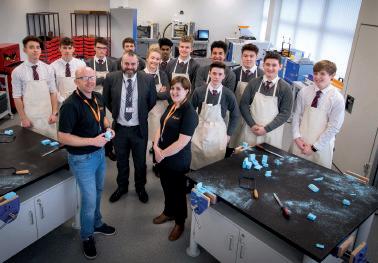
The Government is so concerned about the lack of engineers that it kicked off 2018 by launching The Year of Engineering campaign.
Over the course of the year the campaign aims to shake up people’s ideas about engineering, and inspire the next generation of innovators, inventors and problem solvers by revealing to the wider public what engineers actually do.
Renishaw, which has its headquarters at Wootton-under-Edge, has always
offered an extensive education outreach programme, especially across its home turf of Bristol, Gloucestershire and South Wales. It has also won awards for its graduate employer benefits.
The campaign is supported by many of the country’s biggest engineering organisations and companies, including the Royal Academy of Engineering which has launched a new digital marketing campaign, This is Engineering, to rebrand engineering for young people aged 13-18. Campaign partners include Siemens, BAE Systems and the National Grid, among many others.
A specialist provider of outsourced back office and financial solutions to the recruitment sector is celebrating more than 300 users adopting its new customer relationship management (CRM) and workflow system in just two months after launching.
Simplicity, which is based in the Forest of Dean, invested millions of pouns in GEMS, a unique recruitment CRM and workflow solution that combines front and back office systems into one simple profess.
Jonathan Viney, Director at Simplicity, said: “GEMS is specifically designed for recruiters to manage everything from candidate and client management, job bookings and timesheets (online or
Spotlight on recruitment
paper) to payroll, invoicing, HMRC/ AWR compliance, credit control and full reporting – all via a single workflow management platform.”
It helps busy recruiters save time and reduce costs, he adds. “Our initial research found that the typical recruiter spends on average up to 20% per cent of each week performing administrative tasks.
“Thanks to initiatives such as GEMS, recruiters can reduce their time spent on administrative tasks and focus more on business development.”
According to figures released by Companies House, the number of recruitment agencies registered as trading businesses increased
from 12,000 in 2012 to a 29,000 today. Despite the uncertainty of Brexit, employer confidence remains positive with a quarter of hiring managers planning to increase their headcount in the coming months.
Add the Recruitment and Employment Confederation’s predictions that 56% of all vacancies will be filled by Recruitment agencies at the end of 2018 and it becomes clear why so many ambitious recruiters fancy their chances of becoming a successful recruitment entrepreneur.
With the number of recruiters operating in the UK at a record-high, there is a pressing need for recruitment business leaders to streamline their operations, increase efficiencies and become more competitive.
“Young people are far more likely to choose a career in science or engineering if they become interested at an early age”
Spotlight on recruitment
UK Construction Week, being held at the National Exhibition Centre in Birmingham between 9-11 October, is launching a new initiative for 2018 to help the industry compete for talent. It is inviting role models in the industry to tell their story in a nationwide publicity campaign.
Role models will take part in an outreach programme, visiting colleges and schools to talk to students and teachers at key stages of their education to explain what inspired them to choose construction as a career and bust any myths around the image of construction.
Nathan Garnett, Event Director for UKCW explains, “There are some amazing people working in the sector and their stories can be inspirational to others.”
With British construction needing 400,000 people every year between now and 2021 if it is to create the homes and infrastructure the nation needs, a new group which aims to shape the future of construction apprenticeships has been formed.
The Construction Apprenticeships Working Group is chaired by Steve Hearty, Director of Apprenticeships at the Construction Industry Training Board (CITB), and includes key industry figures from a range of large and SME contractors.
The group aims to support the Construction Leadership Council (CLC), by using evidence to identify construction’s future apprenticeship needs and the development of construction apprenticeship standards.
A group has been launched to help tackle the issues around employability and skills in Coventry and Warwickshire.
The Employability Group has been established by the Coventry and Warwickshire Chamber of Commerce and was borne out of discussions around a shortage of staff and skills.

The group includes representatives from business, education and local authorities.
The first meeting heard that companies right across the region can tap into support from the Chamber if they are facing a barrier to growth because they cannot find suitable people to fill vacancies they have.
The Chamber can also help to signpost companies to other forms of support that can help them to look at different ways of bridging the skills gap – from growing their own through apprenticeships or help for people with disabilities to get into work.
Martyne Manning, a business coach and policy officer at the Coventry and Warwickshire Chamber of Commerce, said: “The issue around the skills gap and the skills shortage has been a hot topic of conversation at our branches across the region for some time.
“The concerns around Brexit and what this may mean to hiring staff from the EU have exacerbated the problem.”
“We know it’s not an issue that can be solved overnight but this group is going to ensure that we look at every way possible to support businesses in their quest to grow and take on staff.
“The concerns around Brexit and what this may mean to hiring staff from the EU have exacerbated the problem”

Spotlight on recruitment
The IHS Markit/REC Report on Jobs published last month revealed a further sharp increase in permanent staff placements across the UK, with the pace of expansion edging up fractionally since February. In contrast, temp billings expanded at the weakest pace for over a year.
The report, which provides the most comprehensive guide to the UK labour market, draws on original survey data provided by recruitment consultancies.
Staff vacancies continued to rise at the end of the first quarter. This was despite
According to research from the University of Gloucestershire undertaken in 2017, programmers and software developers were the top skills sought by employers in the county.
Cyber security skills are also in very high demand. Research published earlier this year by management consultancy Capgemini revealed there is a 25 per cent gap shortfall in the supply of skilled cyber security professionals.
The demand for cybersecurity talent is projected to grow over the next two to three years, the report confirms.
The National Cyber Security Centre, part of GCHQ, is supporting the development of the UK’s next generation of cyber professionals. It has student bursary and apprenticeship schemes, courses for 11-17 year olds and a girls competition to help nurture talent.

A key way to encourage young people into a career in cyber security is through gamification, according to IT security company McAfee.
growth of demand easing slightly to the lowest for 15 months, driven by a weaker upturn in temporary staff positions.
However, the supply of candidates continued to decline sharply during March, though the latest reduction was the weakest seen for one year.
Average starting salaries continued to increase sharply in March, despite the rate of inflation softening to a tenmonth low. Pay for temporary/contract staff rose at the quickest pace since last September.
The upturn in permanent staff placements was once again led by the Midlands.
In the private sector, there were marked rates of vacancy growth for both permanent and temporary workers.
Vacancies for permanent and short-term staff across the public sector rose at steeper rates compared to February.
Engineering led the rankings for demand for permanent staff during March, closely followed by IT & Computing. but permanent job vacancies also rose markedly across the board.
Gamification is the concept of applying elements of game-playing to non-game activities. Organisations that hold gamification exercises such as hackathons or ‘capture-the-flag’ competitions are more likely to attract new recruits.
Nearly all respondents to a survey, conducted by online security company McAfee, believe that gaming gives its
players the experience and skills critical to cybersecurity threat hunting: logic, perseverance, an understanding of how to approach adversaries and a fresh outlook compared to traditional cybersecurity hires.
It’s likely that anyone entering the sector will be well-paid. Day rates for cyber security experts have hit £1,400 say industry experts.
Immunocore is one of the UK’s most exciting biotech companies. It is pioneering a new platform of therapies to target cancer, autoimmune diseases and infectious diseases
 By Nicky Godding
By Nicky Godding
Immunocore, based at Milton Park, Abingdon, is a clinical-stage biotech company developing complex biological drugs to treat cancer, autoimmune diseases and infectious diseases.
As a result of its research, Immunocore has become a leading T cell receptor (TCR) company thanks to its “immune mobilizing monoclonal TCR against cancer” (ImmTAC) molecules, which use soluble TCR technology.
However complicated this might sound to the layperson, Immunocore’s science is causing substantial interest across the scientific community and excitement among investors.
To those of us who are not bioscientists, it can be a challenge to appreciate the full complexity and potential of Immunocore’s technology.

What makes the company’s biological therapeutic platform unique is its ability to redirect the body’s own immune system to specifically destroy cancer cells.
Dr Andrew Hotchkiss joined Immunocore as Chief Commercial Officer last October, after a successful career with global pharmaceutical company Eli Lilly. He took over as CEO following its previous incumbent Dr Eliot Forster stepping down from the post in February.

“I joined Immunocore because of the exciting science that underpins the technology. I believe that our platform and portfolio of products has the potential to significantly help patients,” he says.
Immunocore’s first lead product, IMCgp100, is currently undergoing clinical trials for the treatment of metastatic uveal melanoma (a cancer of the eye). This condition has an
exceptionally high unmet medical need with no current standard of care.
“We believe this therapy has the potential to be a game-changer for medical practice in this devastating condition,” explains Andrew. “We’re optimistic that the encouraging data we have seen has the potential to read across to other ImmTAC programmes, especially when addressing difficult to treat tumours which have proven challenging for other therapies. We are excited by the possibilities of the ImmTAC platform in cancer and beyond.”
Immunocore is now applying its TCR platform to target autoimmune diseases, as well as collaborating with the Bill & Melinda Gates Foundation to develop immunotherapies for infectious diseases such as HIV and tuberculosis.
Using the body’s immune system to fight cancer has been one of the hottest topics across the world’s medical research community in recent years, and many companies are following different research routes to achieve that objective.
“I joined Immunocore because of the exciting science that underpins the technology. I believe that our platform of products has the potential to significantly help patients”Dr Andrew Hotchkiss Chief Executive Immunocore An ImmTAC molecule
The key challenge for any biotech company is trying to progress the science while securing the necessary funding to take that progress further.
“Immunocore secured early investment,” says Andrew. “And those investors have stayed with the company throughout our journey and are still with us.”
Belief in Immunocore’s technology platform has come from across the board.
In June 2015, it won the “Emerging Star of the Year Award” at the European Mediscience Awards. This is the largest annual gathering of private and publicly quoted healthcare, biotech and life sciences companies in Europe which recognises the importance of the capital markets to fund growth and innovation.
The biotech company also has a pipeline of wholly-owned and partnered products in development. Partners include Genentech, GlaxoSmithKline, AstraZeneca and Lilly.
Immunocore has gone through a period of significant expansion in the last two years.There are more than 40 nationalities working at Milton Park, drawn from academia and the biotech industry, and an office in Conshohocken, PA in the USA.
Andrew is keen that Brexit should not close off the UK’s access to talent, and that the scientists already working for the company maintain the confidence to continue to build their careers here.
He also flags up the fact that the European Medicines Agency is relocating from London to Amsterdam. “We must ensure that such change isn’t going to delay getting drugs approved for patients that need them.”
It can take up 12 years and £1.2 billion to develop a new medicine, according to Stephen Whitehead, Chief Executive of the Association of the British Pharmaceutical Industry.
“Much of the investment recouped by the industry is used to fund future research and development for new medicines that will benefit patients in the future.”
The UK represents under three per cent of the global pharmaceutical market. While that could appear small in a global context, this country is widely acknowledged to be a very strong breeding ground for ideas and research.
“Intellectual property is undoubtedly the cornerstone of any business in the life sciences sector,” says Andrew.
By July that year, with enough good clinical data for investors to believe it had something that could make a real difference to patients, the company completed a £205 million private financing round.
This was oversubscribed and included new investors Woodford Investment Management, Malin Corporation plc, Eli Lilly and Company and RTW Investments, as well as new and existing investors.
Other awards followed, and in September last year, Immunocore and the Bill & Melinda Gates Foundation announced their $40 million collaboration to develop immunotherapies for infectious diseases. that pose a global health challenge.

But he’s an optimist. “The life sciences are seen as one of the UK’s crown jewel industries and over the years the government has invested heavily in this area.
“We have good universities and a good science base. We have a good eco system and big pharmaceutical companies based here who are still investing. We have strong biotech clusters alongside the NHS which is a significant opportunity in itself in terms of data and running clinical trials.”
He added: “The UK has a high reputation for biotech and there is a great deal of trust globally in our eco system. You need a certain size and critical mass and I think we have that in this country. At the end of the day it’s all down to the quality of the science.”
“Establishing strong IP protection, for example through patent filings, increases the barrier to entry for competitors and provides confidence to potential investors, allowing businesses to further develop their technology and ultimately to bring products to market.
“At Immunocore, we have built a broad, multi-tiered IP portfolio protecting our platform technology and novel TCR-based immunotherapies.”
Immunocore was built on research and that won’t ever change, says Andrew. “We hope that within the next couple of years we can get our first product through to approval.
“In a decade we hope to have more products to market, maintaining leadership in our platform and fulfilling our purpose of producing transformational science that transforms lives.”
“Immunocore secured early investment and those investors have stayed with the company throughout our journey and are still with us”Immunocore Immunocore An ImmTAC molecule in action


The application of science and technology saves and enhances lives, helps feed more people and generally makes the world a better, safer place to live.
That’s not to say, of course, that such knowledge isn’t being put to nefarious use by some, but most of us would prefer that medical science continues to improve and save lives, that technology facilitates better global communication and that research into a wide variety of sectors continues.

Such investment will not only help put right what the world got so wrong decades ago, such as reducing the world’s carbon footprint and the vast amounts of waste floating around in our oceans, but also drive future experimentation, innovation and invention.
This magazine regularly reports on earlystage science being carried out by some of the UK’s most exciting companies as the region we cover is so rich in ideas, particularly within the Oxfordshire Science Vale. And in this issue you can read our interview with Andrew Hotchkiss who leads one of the region’s hottest biotechs: Immunocore.
However, this feature reveals technologies and ideas that are directly impacting on our 21st century lives – from a simple online babysitting service to battery technology which will harness renewable energy more efficiently by being able to store it for longer. This feature can’t do justice to the vast pool of incredible companies working on amazing projects, but offers a flavour for your delectation, and we’ll be returning to the topic in more detail later in the year.
What will happen to all the local car service and repair businesses when the increase in the use of electric cars means there’s no longer a traditional car combustion engine to service?
A third-generation local car service and repair company in Cheltenham has seen the challenge ahead for its traditional business and is expanding into the service and maintenance of electric vehicles.
Cleevely Motors, based at Tivoli, set up Cleevely EV after owner Matt Cleevely hired a Tesla for a weekend last summer to
see what all the fuss was about.
Matt, 38, who’s qualified to the highest car technician level, had previously bought a Nissan Leaf EV as a second family car – and loved it. “It’s a great way to drive,” he said. “There’s instant torque from the electric motor and I became interested in the technical side after driving the Tesla.”
He decided to set up Cleevely EV, and will be opening new premises on Lansdown Trading Estate in Cheltenham next month. Matt has now expanded his business to become an electric vehicle advisory centre
to be four generations, so we have to adapt. And we’ll aim to feed into other related areas, such as installing EV charging points.
“This is smart technology, so we have to adopt a new smart business model to meet the new demand.”
Science and technology makes the world a better place. We look at some of the
Millions of pounds are being invested in battery technology. What difference will that make to our lives?
Good news. The use of fossil fuels is declining and there has been a corresponding rise in renewable energy generation from sources including wind, wave, marine, hydro, biomass and solar.

Energy storage has to be one of the most important technologies of the modern world and while the UK is rather good at creating energy out of natural resources, its storage is more of a challenge.
When wind’s blowing and the sun is shining, everything’s fine. The power stays on and excess energy is generated. But when the wind drops and the sunshine

A £7 million project, funded by Innovate UK and led by Oxis Energy based at Culham Science Centre at Abingdon, is aimed at transforming electric vehicle technology for commercial use.
The Lithium Sulfur Future Automotive Battery (LiSFAB) project will develop a next generation cell and module that is suitable for large electric vehicles such as trucks and buses and allows them to carry considerably more payload.
Chris Flowers, LiSFAB project manager at Oxis Energy said: “This project is of major importance to the UK’s development of next generation cells and modules for large electric vehicles. The technology that we are developing in this project will also be applicable to OXIS’ other key markets such as aerospace (including space) and energy storage.
Huw Hampson-Jones, Oxis Energy CEO added: “The LiSFAB project is a significant step forward for Oxis Lithium Sulfur
disappears – what use is renewable energy then if it can’t be saved and used when we need it most?
The Government has committed to investing £247 million to support the development of new battery technologies. This will pay for research, innovation and scale-up facilities to support an electrified economy. To begin with, the money will mainly fund the automotive sector to help the UK move to full electrification and zero emission vehicles.
In October last year, the governmentfunded Faraday Institution opened at
Harwell near Didcot. This is now the UK’s independent centre for electrochemical energy storage science and technology which is bringing together expertise from universities and industry.
The potential economic value of battery storage is also now being realised by the commercial sector. In March the private equity firm Gore Street Capital announced its intention to launch the world’s first energy storage fund, to be listed in London. The fund will invest in energy storage projects primarily located in the UK and using lithium-ion battery technology.
chemistry and technology. Achieving the programme’s goals signifies that we can replace fossilised fuel with rechargeable batteries that are benign to the environment. When Europe is spending £1 billion a day on oil, Oxis Li-S batteries make a big impact towards reducing pollution.”
Oxis Energy is involved in the design, development and increasingly commercial
Lithium Sulfur (LiS) technology has the potential to store five times more energy per Kg compared to Lithium Ion (Li-ion) battery technology. Li-ion is a mature, well understood battery technology, discovered in the UK in the 1970s, allowing easy manufacture. LiS raw materials cost less and the technology is inherently safe.
production of Lithium Sulfur cells for battery systems. With 36 patent families, the company has been granted 111 patents with 108 pending.

The family smart car could be powering our homes if new research on Vehicle-2Grid (V2G) technology is successful.
The government has committed almost £30 million in funding research into V2G technology which enables electric cars and other vehicles to deliver electricity back to the smart grid to light homes and power businesses.
V2G technology enables plug-in electric vehicles to intelligently communicate with the power grid – potentially returning excess electricity back to the grid and lighting homes and offices while the vehicle is parked or inactive.
This technology would make the UK power grid more efficient as electric vehicles grow in popularity, creating huge potential savings for consumers, businesses and utility companies.
Part of the £30 million funding will be spent on a £5.6 million research project on electric vehicle charging infrastructure on the UK’s roads.
The EV-elocity consortium, which includes WMG at the University of Warwick, is conducting a three-year project on V2G technology across UK locations, including airports and business parks to prove its viability and worth to business and the wider public.
The project will break new ground in helping consumers, businesses and infrastructure providers to financially benefit from adapting their charging behaviour and vehicle use.
Dr James Marco, Reader in Vehicle Electrification and Energy Storage at WMG,said:
“This is an exciting opportunity to study the possible benefits of V2G technology in the real world and to construct a new holistic model of how best to optimise the ever-increasing integration of electric vehicles and our energy infrastructure.”
Technology
The UK needs to encourage more people, and from a very young age, to take an interest in science. The world needs scientists, engineers and innovators – and the earlier they take an interest in science and technology, the better.
But the interest isn’t confined to young people. We all love a scientist: the comedian Dara O’Briain studied mathematics, chemistry and theoretical physics at university, Harry Hill qualified as a doctor, Queen’s Brian May is an astrophysicist and Gloucestershire-based comedian Ben Miller studied natural sciences at Cambridge.
Physicist Professor Brian Cox can singlehandedly sell out some of the UK’s biggest arenas, including Wembley, with his science tour – and he doesn’t pretend to be a comedian or guitarist.
Public science festivals are a great access point to science. Across the UK science festivals are often free to attend.

In this region the ATOM Science & Technology Festival takes place every March in Abingdon, Oxfordshire’s Festival of Science will take place from October 12-22 and the big one, the Cheltenham Festival of Science takes place from June 5-10.
At this year’s Cheltenham Science Festival, world-leading experts in cyber
security and AI (artificial intelligence) are among an international cast of top scientists, performers and big thinkers.
Connected: Divided is the Festival theme. It explores what connects and divides us as a species – from personal relationships, health and language to the law, global politics and the universe.
“The world needs scientists, engineers and innovators – and the earlier they take an interest in science and technology, the better”
More than 280 leading experts in the fields of psychology, biology, technology, engineering, anthropology, health and current affairs will make their way to Cheltenham for the six-day event.
The Festival’s new Cyber Zone will also bring the public face to face with innovative organisations, including DeepMind – the world-leading AI research company.
It’s creative and colourful events like this, underpinned by meaty content and the opportunity to listen to world experts, that will help stimulate new science and technology thinking.
Plastic wrapping is the new public enemy number one, thanks in no small part to fallout from the shocking ocean waste segment in the BBC’s Blue Planet series.

But it doesn’t have to be that way and thousands of companies have been using thinner, lighter plastic wrapping for years. More recently new methods of clear wrapping have been developed using water-soluble films and bio-degradable products which means that rather than a plastic wrapper moldering away in a municipal waste dump for decades, it could decompose within weeks on a compost heap.
One company leading the way is Polythene UK. Over the last 10 years the company, led by founder and managing director James Woollard, has invested hundreds of thousands of pounds in product development at its Witney factory.
As a result, it has trademarked and is now selling Polyair (made from sugar cane products), Polycomp (made from compostable products), and the completely recyclable industrial food-grade Polyolefin. These are being sold alongside its original product of Polylite, a thinner,
lighter polythene which has already helped hundreds of manufacturing companies reduce their carbon footprint.With the raw material being imported into the UK for its primary use, importing the finished goods has no bearing on the CO2 impact.
Polythene UK is an independent broker and specialist manufacturer of polythene packaging which turns over around £12 million annually. An award-winning business, it was named as “One to Watch” in the 2018 European Business Awards.
James has worked in the polythene industry for 30 years, and before setting up Polythene UK in 2007, worked for French company The Barbier Group which develops and sells unique and exclusive bio and non-bio polythene films and bags.
“The French are way ahead of the UK in terms of their approach to the environment,” he says.
“For instance, they banned the use of noncompostable films for wrapping something to be posted though a letter box. This is currently under review at Whitehall and we
hope the UK will follow their lead in the next 12 to 24 months.”
“Polylite was developed in France and I was able to manufacture and sell it in the UK when I established Polythene UK. We’ve since gone on to develop our own polythene recipes.
“Getting the technology right is an exact science. Then we have to ensure that our manufacturers can actually make it.”
Polythene UK has licensed its recipes under contract to two UK and five overseas factories.

James’ biggest bugbear is that most of the multi-national brands which use plastic wrapping won’t take action. “It means time and effort to test new films and they hide behind the fact it might be 1p more expensive and they cannot pass that on.”
So much so that Polythene UK no longer tries to engage with the big brands, instead selling to more than 2,000 small and medium-sized manufacturing businesses across the UK and overseas.
“There is no arguing that greener solutions are often a bit more expensive than the fossil fuel alternative,” explains James.
“And for the big companies, changing what they are currently doing is complicated. It takes time, people and equipment costs as well as unpicking the supply chain.
“Selling to smaller manufacturers is easier for us, they’re more flexible and often have to meet high standards, which we can help with. And collectively – they buy more.”
However, the Blue Planet effect on consumer attitudes has started to have an effect on the multinationals, many of which are now publically committed to making radical changes to their packaging.
“The big retail brands in particular are finally having to wake up to consumer demand,” says James.
One of Polythene UK’s latest development projects, a carbon neutral 100 per cent recyclable collation shrink film, is being done in conjunction with Harrogate Spring

A company that is working on technology that can map out the real world for augmented reality using smartphones, has received funding from Massive Attack band member Robert Del Naja, along with other investors.
The business, which was the 150th spinout from Oxford University and has also secured investment from Oxford Sciences Innovation, hopes to open up a whole new area of development in the augmented reality sector. The 6D.ai API uses a standard built-in smartphone camera to build a real-time, threedimensional semantic, crowd sourced maps of the world, all in the background. No depth camera is needed to capture the world in 3D.

An Oxford University spinout is aiming to 3D print therapeutic tissue that can be used by patients in the clinic for precision medicine and organ repair or replacement.
OxSyBio, based at Harwell, has a unique 3D printing platform which enables it to assemble the building blocks of life. The synthetic biology company’s ultimate ambition is to fabricate therapeutic tissues for patients using living cells or non-living “artificial” cells, or hybrid materials.
Water and James hopes the product will be launched later this year.
His approach to sustainability doesn’t stop at the company’s products. In 2013 the company opened the UK’s greenest commercial building. “My mission is to be as carbon-positive as possible. As a company we also don’t send our sales representatives out on the road. We try to avoid using cars as much as possible,” he adds.
When the Prime Minister Theresa May “declared war” on plastic earlier this year (albeit within a rather unambitious 25 years), it clearly caught the mood of the nation. The Queen too has reportedly banned plastic straws and bottles from the Royal Estates.
As a result some companies have been quicker to react than others. Iceland supermarket pledged to eliminate unrecyclable plastics five years ahead of that and UK fashion retailer Asos hopes to switch to reusable packaging although it has not, as yet, set a date for the initiative to be rolled out.
These tissues have the potential to revolutionise the growing field of regenerative medicine, allowing for the literal printing of new tissues that can be used to repair or replace parts of the body damaged through disease or injury.
OxSyBio, which is underpinned by research conducted in the lab of Professor Hagan Bayley, the founding academic behind the £1.5 billion-valued Oxford Nanopore Technologies, was spun out from Oxford University’s Department of Chemistry by the institution’s innovation arm Oxford University Innovation in 2014.
OxSyBio can 3D print biology on to functional materials and tissues
“Selling to smaller manufacturers is easier for us, they’re more flexible and often have to meet high standards, which we can help with. And collectively – they buy more” Technology
“The synthetic biology company’s ultimate ambition is to fabricate therapeutic tissues for patients using living cells or non-living ‘artificial’ cells, or hybrid materials”
The first autonomous vehicle trials on public roads in the UK are to take place at Milton Park, Abingdon.
Led by UK transport operator FirstGroup, a consortium of eight organisations was awarded £2.5 million from Innovate UK in February as part of the latest round of connected and autonomous vehicles (CAV) competitive funding.

The 30-month project aims to ultimately establish a new “Mobility as a Service” (MaaS) travel system using AVs for everyday journeys.
This would bring together taxis, buses and on-road shuttle vehicles to help link journeys from existing transport networks such as railway and bus stations to business parks.
Gloucestershire-based on-demand childcare firm Kowalah completed its first round of fundraising in April, expecting to raise £200,000 in a bid to become a leading provider of babysitting and childcare.

Founded by Candy Cowan in 2016, Kowalah connects local providers of childcare and babysitting with busy parents looking for support during the daytime.
She wanted to find out if parents would see Kowalah as “just another app” and distrust the idea of technology solving the real world problem of finding a safe person to help with their children. Or would they be able to see that it was providing access to someone they knew, or knew of, who lived locally, and Kowalah just made it much easier to find and pay them?
Located in the Science Vale, the consortium will leverage world-class expertise from the high concentration of AV and robotic related companies already based there.
This includes Oxbotica, which is leading another consortium testing a fleet of AVs deployed in urban areas and on motorways and Culham Science Centre, with its world-class test bed facility for autonomous systems. Sustainable travel is already under way at Science Vale following a 12-month green travel
“Sustainable travel is already under way at Science Vale following a 12-month green travel campaign at Milton Park last year”
campaign at Milton Park last year. Led by MEPC, the manager and developer of Milton Park and transport consultancy, Vectos was a green travel plan encouraging commuters to explore other forms of travel over using their private car to get to work.
Oxford-based Bodie Technologies is aiming to transform how and where we interact with displays.
More than half of Kowalah bookings are from working parents looking for additional support during the day.
Having invested in a robust interview process for new sitters (Candy calls them Kowalahs), parents are embracing the Kowalah model.
The team will use the new funding to accelerate development of the Kowalah platform as well as increasing sitter recruitment to ensure sufficient numbers of safe and interviewed Kowalahs are on the platform to cope with increasing parent demand.
The company is developing reflective display technology for applications that include wearables, Internet-ofThings (IoT) displays and eReaders. The technology could soon turn commonplace static printed materials, such as posters and packaging into low-cost dynamic displays.
Today’s electronic displays are commonly based on LCD (liquid crystal display) and OLED (organic light emitting diode) technology.
Bodie Technology’s pixels reflect light, drastically reducing the power required to project an image and eliminating power requirements for a static image altogether.
The concept of innovation, either in terms of a product or service, is often used as a key way of differentiating yourself from the competition. Technology is increasingly being used to solve a range of real world problems and many businesses in Gloucestershire are pioneers in this arena.
Tidal Lagoon Power is hoping to supply power to the UK energy market via six tidal lagoons that will harness the natural power of tides along the UK coastline. Its use of innovative technology to turn a natural and predictable power source from our coastal tides into electricity could meet the power needs of up to 30 per cent of UK homes.
And pioneering technology is not just limited to physical ideas and concepts. Companies such as PixelPin are providing a solution to the age-old problem of forgetting your password. Using a picture, you can login to websites by clicking on specific parts of the image rather than creating (yet another) eight-character password using the inevitable and complicated mix of uppercase, lowercase and special characters.
The importance of disruptive technology is also highlighted via the investment being made in the UK Digital Retail Innovation Centre in Gloucester. This centre will showcase the latest retail technologies and innovation such as holographic “virtual employees”, robotic security guards and 3,600 virtual mirrors. For inventors looking to build prototypes and test concepts, the rise in popularity
and accessibility of 3D printing allows them to hone their product designs ready for investment or production.
Great opportunity brings its own risk. However, as Riyaz Jariwalla, Partner at BPE Solicitors notes, this ease of access could also have an impact on existing designs and concepts which need thorough protection as copying or adapting designs is increasingly becoming a threat. If you have invested time, money and effort into creating a unique idea, the last thing you need is someone copying it for their own gain and without any benefit to you.

With this in mind, it’s important to consider what intellectual property rights are appropriate in order to protect your idea, such as design rights, copyright, trademark rights and patents.
Preparation is key – ensure that you have the appropriate protection in place.
Apply to register:
All trade names, brands, logos as trademarks
All unique and novel shapes and designs as registered designs
Any inventions as patents
Once secured, ensure that all certificates of ownership and details of the protection are located centrally and are accessible.
If you believe your ideas are being copied, seek professional advice regarding obtaining legal expenses insurance, which can provide you with a war chest for policing and protecting your intellectual property rights.
A patent is known as the “grandfather of intellectual rights” and protection is available for most industrial applications, methods of doing or processing and mechanical devices. As long as renewal fees are paid annually, a UK patent has a life of 20 years. After this time expires, the public is free to exploit the idea without any influence by the inventor.
Correctly-worded patents and copyright applications or trademarks, when established ahead of time, can facilitate growth and innovation and help solve real world problems.
“For inventors looking to build prototypes and test concepts, the rise in popularity and accessibility of 3D printing allows them to hone their product designs ready for investment or production”Riyaz Jariwalla, Partner at BPE Solicitors


The Home Builder’s Federation wants the Government to develop its Help to Buy policy, creating certainty that it will continue after the current scheme ends in 2021. “We want to know what will happen after that,” said Steve.
The housing market has been chronically undersupplied for decades and it’s going to take years for the UK to return to delivering the number of homes this country needs.
While the industry is on target to deliver the million homes the government challenged it to build (last year there were around 225,000 net additions to the UK’s housing stock), that’s still well short of the Government’s ambition to build 300,000 a year. Good progress is being made, but much more needs to be done.

Supply is up for a number of reasons, according to Steve Turner of the Home Builders Federation.
“The government has created a much more positive environment through its National Planning Policy Framework and its Help to Buy initiative which has had a considerable impact on the ability of people to buy new homes, and therefore on builders to build.”
In March, the government released an updated National Planning Policy Framework, out for consultation until mid-May. Paul Barton, Associate Town Planner at Bruton Knowles, feels the updated NPPF is more in favour of development. “However, it’s like turning around a tanker. Changes are happening, but it takes time for them to have the desired impact.”
What continues to hold back housebuilding? Understaffed and underfunded planning departments within local authorities are a huge drag on getting planning permissions granted. While planning fees rose 20 per cent in January, it’s up to the local planning department whether that rise funds an increase in headcount or is allocated elsewhere.
There is also not enough land coming through the planning system quickly enough. While it’s improved significantly over the last few years since the first NPPF, more needs to happen to ensure planning is implemented quickly and positively so local authorities can speed up planning permission.
Skills is the other big issue. After the 2008 recession, the UK lost 50 per cent
of its skilled construction workers. While the last few years have seen tens of thousands of new employees being recruited and trained, more are needed to deliver the government’s homebuilding target.
Finally, more housebuilders are needed. According to Steve Turner: “We need more players on the pitch. Since 2008 the number of small and medium-sized building companies has collapsed, first because of the recession and in the last few years due to the bureaucratic nature of the industry and the planning system. Smaller companies can’t compete on site with larger housebuilders geared up to build thousands of homes.”
But access to finance for smaller housebuilders has eased. In 2016 the government set aside a £3 billion fund to help smaller housebuilders finance developments. The Home Builders Fund is administered by the Homes and Communities Agency and provides development finance loan funding to meet the development costs of building homes for sale or rent, and infrastructure finance loan funding for site preparation and infrastructure and to prepare land for development.
There is a housing crisis, everyone agrees. But it is easing. Figures show that housing output has gone up 74 per cent in the last four years and build quality is improving.
The number of houses being built in the UK is up for debate. The government produces a range of different statistics on housebuilding, and according to the Home Builders Federation, its Net Supply of Housing data is the most accurate. But this still lags behind the real number being built as the new figures published every November are for the 12 months up to the beginning of the previous April.
The government also used to publish quarterly figures on housebuilding which were so inaccurate they stopped issuing them. “It was a massive undercount on what’s being built, it’s bonkers,” said Steve Turner of the Home Builders Federation.
Business & Innovation Magazine contacted a number of local authorities across our region for this feature. We asked them how many new homes had been built in their region over the past year and how many had received planning permission to be built. None of the planning authorities were able to provide definitive figures.
The Federation says that official statistics are undercounting delivery to the extent of a town the size of Stevenage each year. Over the course of a parliament in which the government is targeting one million new homes, a city the size of Nottingham or Newcastle is being completely disregarded.
“We’ve criticized the government publically on its inaccurate figures,” said Steve. “We’ve started looking at the data for Energy Performance Certificates being issued as every new house has to have one. They usually correlate with the net additions figure.”
The UK’s Green Belts were introduced in 1947 to control urban sprawl and provide a “green lung” for some of the country’s towns and cities, but are they still relevant? According to the Campaign to Protect Rural England, 425,000 houses could be built on the country’s green belts.

Is that a bad thing? Neoliberal think tank the Adam Smith Institute calls the Green Belt a “green noose”. In a 2015 report it says: “Green Belts are not the bucolic idylls some imagine them to be; indeed, more than a third of protected Green Belt land is devoted to intensive farming, which generates net environmental costs.”
Paul Barton at Gloucester-based Bruton Knowles said: “People often misunderstand what is mean by the Green Belt. The Green Belt fails when development that could be done closer to a town can’t be achieved because the land is designated “Green Belt”. Instead, houses are built outside it and
“We’ve criticized the Government publically on its inaccurate figures, and we’ve started looking at the data for Energy Performance Certificates being issued as every new house has to have one. They usually correlate with the net additions figure”
people commute over the Green Belt to get to the centre, creating a greater need for transport which goes against the desire for sustainable development. It’s the doughnut effect.”
David Foreman, Managing Director at regional housebuilder Newland Homes, agreed. “Developers are not despoilers of the Green Belt, but we do become frustrated when people use it as a default to say no to development. It is an arbitrary area of land of varying quality. Some indeed should be cherished and protected, other land designated Green Belt is no more than scrubland. We would like to see the Green Belt being nibbled at when it’s
appropriate or added to in areas where it might offer more benefit.”
The Royal Town Planning Institute suggests that the role, purposes and social impact of Green Belts should be revisited and boundaries may well need to change, albeit with safeguards.
Government policy on protection for the Green Belt is set out in its National Planning Policy Framework, which states that that the construction of new buildings should be regarded as “inappropriate” for the Green Belt, although there are some exceptions.
It passes the buck to local authorities. “It is for local authorities to define and maintain Green Belt land in their local areas.”
There is one thing on which all sides appear to largely agree, and that’s set out by the CPRE. Its 2017 report Green Belt Under Seige says: “Deciding where the most appropriate land for housing development is, and how to balance building the homes we need with protection of our precious countryside, has never been more urgent.”
Figures released in April from the Office of National Statistics shows that while construction output fell between December 2017 to February 2018, private house and infrastructure new work were the two bright spots.
Following strong growth throughout most of last year, and in the first two months of 2018, private housing new work increased by £42 million in February 2018. Public housing new work also grew marginally following a decline in the previous month.
But faced, yet again, with uncertain conditions, the construction industry is being urged to check their construction industry insurance, designed to cover property during the course of construction, is fit for purpose.
Last year Allianz, one of the UK’s largest general insurers, created a dedicated team of specialist
construction underwriters to support the sector, offering expert advice delivered by specialist construction risk control surveyors and the insurer’s in-house team of engineers.
Allianz’s offer, Construction Select, also includes legal and a specialist construction claims service.
Allianz’s director of engineering, Chris Little, said: “More than ever, the construction sector needs strong support from experts in the field such as Allianz. We are a market-leading player in the mid-corporate construction sector and our expert-led team is supporting construction companies across the UK.
“Our customers need a broad variety of cover needs and our teams are focussed exclusively on the construction market so they can answer the questions and provide the service that they need. We want to add value to the construction sector.”
House Building
Planning permission has been granted for more than 2,000 new homes to be built north of Gloucester. 1,300 homes north of Innsworth Lane and 725 homes near Twigworth.

Planning permission has been granted to developer Robert Hitchins by the Secretary of State for two mixed use developments on land formerly within the Green Belt to the north of Gloucester.
The sites were removed from the Green Belt on adoption of the Gloucester Cheltenham Tewkesbury
Joint Core Strategy last December and the appeal decisions issued two weeks later following a conjoined Inquiry that took place in June 2017.
The Innsworth Scheme includes 1,300 homes, 20 acres for employment, including a neighbourhood centre of 10 acres, a primary school, playing fields and social/community facilities.
The Twigworth scheme is for up to 725 homes, a local shopping centre of 0.8 acres, new primary school, playing fields and social/community facilities.


Collaborative local/district council developments on brownfield or former government/MOD land has risen.
According to Mark Taylor, Head of Public Sector at insurance brokers Stackhouse Poland, this makes sense as larger developments need significant infrastructure and investment in local amenities such as retail, light commercial and education.
“Collaboration helps with planning permission and co-operation,” he said.
“However newly-formed development companies create additional risk exposures relating to complicated legal structures, stakeholders, unclear corporate governance responsibilities, contractual risk exposures and supply chain issues.”
A former military base at Bicester in Oxfordshire is set to become the UK’s largest self-build and custom-build development.

When complete, Graven Hill will be home to 1,900 homes.
Construction began last year on the foundations for the first self-build properties.
Buyers purchase a ‘plot passport’ which includes information on the plot size, maximum gross internal area and height of the building, as well as vital information such as acceptable building materials, main services provision and likely ground conditions.
If the purchaser’s design falls within the guidance, planning permission is guaranteed approval within 28 days.
Cherwell District Council, which owns The Graven Hill development company, wants to promote a range of housing options, including self-build and custombuild.
Marcus Saunders, Construction Practice Specialist at insurance brokers Stackhouse Poland, said: “We are receiving more enquiries for our new-build/self-build insurance along with requests for our Protek Self-Build Warranty insurance covers which assist with mortgages and building regulation requirements.”
Self-build/custom-build projects increases opportunities for smaller builders which tend to use the more modern construction techniques, in particular modular/timber frame. Often the proportion of self-build will extend beyond the government driven 15 per cent quota, added Marcus.
Land shortage and planning permission issues have created a more imaginative approach to building development, resulting in more redevelopment of existing commercial, industrial as well as residential properties said Marcus Saunders, Construction Practice Specialist at insurance brokers Stackhouse Poland.
Vacant commercial property is being repurposed as fund holders look to recoup money/free capital on assets that are not generating rental income, he added.
Modular construction techniques could change the way in which people perceive the lifecycle of a building. “If a building is quick and cheap to build the financiers/
fund managers can achieve a much quicker ROI and buildings could be built with a finite lifespan, knowing they can be disassembled in a few years and replaced,” he said.
Social housing organisations are beginning to wake up to the fact that they could project manage the building of new homes themselves rather than incur the expense of employing major development companies.
But there is a potential downside, he warned. “In a time when there is already a skills shortage, less skilled labour is required (or perceived to be) to build properties and Brexit will only exaggerate this issue.
“We are already seeing that many of the claims made under warranty relate to defective workmanship and quality rather than material failure.”
Stackhouse Poland’s partnership with STA, Constructing Excellence, membership on the Crown Commercial Services SME panel, investment in a structural warranty company, founding the Consumer Code for New Homes (CCNH) is all about the need to understand how its clients work with these new skills and help drive quality in the building area.
“Knowledge is a quality differentiator when applied to risk management,” he added.


Plans lodged by a consortium led by Bloor Homes and Persimmon Homes could result in a £1 billion development on the edge of Cheltenham on a 251-hectare Green Belt site. Named Elms Park, the site will include 4,115 homes, a primary school and a new cyber business park close to GCHQ which could deliver up to 6,000 new jobs. The plans include new transport links into central Cheltenham and Tewkesbury.

The developers say that it would play a crucial role in the region’s future growth and would see more than £1 billion of investment in the area over a 10-15 year period. Once complete, it is estimated that Elms Park would generate around £85 million per year of additional spending into the local economy.
A controversial development bid to build 2,350 homes on the edge of Cirencester, which could increase the town’s population by 40 per cent, has been given the go-ahead by Cotswold District Council.
The Bathurst Developments proposals for Chesterton includes up to 2,350 new homes, potentially including student accommodation and housing for the elderly, a new primary school and land allocated for employment. It will also include a neighbourhood centre at Chesterton Farm.
Following the decision by Cotswold District Council, Bathurst
Development said in a statement: “The application has been subject to an unprecedented level of scrutiny from a multitude of technical consultees, members of the public, officers and elected councillors and was debated at two separate dedicated meetings of the whole council.”
The Secretary of State for Communities and Local Government, Sajid Javid, has decided not to call in the application. In a letter he said that he believed that planning decisions should be made at a local level wherever possible and that this application should be determined by the local planning authority.
The Government has approved a housing deal with Oxfordshire worth £215 million to developer a further 100,000 homes by 2031.
The deal plays a key role in the emerging Cambridge-Milton Keynes-Oxford corridor where the government recognises the need to build up to one million new homes in the area by 2050 to maximise its economic potential.
The investment will fund infrastructure such as bridges and roads and deliver more than 1,300 affordable homes.
Oxfordshire is also home to three garden towns and villages – at Bicester, Didcot and Oxfordshire Cotswold where the government has invested almost £4 million to deliver an additional 30,000 homes.
Cllr Bob Price, Chair of the Oxfordshire Growth Board said: “I’m pleased that so
many councillors of all parties and from all parts of the county have backed the deal. It represents a comprehensive and integrated approach to addressing Oxfordshire’s severe housing shortage and infrastructure challenges.
“The government has said the deal represents a ‘downpayment’ on a pipeline of infrastructure investment for Oxfordshire – and we in the county will work with them to ensure that happens.”


Cala Homes is proposing a major new housing development on brownfield land at Long Marston Airfield, near Stratford-upon-Avon. The proposal for 3,500 new homes on a garden village would include two new primary schools and a new secondary school, shops, a doctor’s surgery, community centre, sports pitches and play areas. Cala’s development will also deliver a new South Western Relief Road, helping to reduce traffic congestion in and around Stratford-upon-Avon.
Funding of £13.4 million from the government’s Housing Infrastructure Fund will go towards improving the local road infrastructure.
Proposals for a new “super-village” south of Worcester have finally been given the green light.
The £500 million scheme includes around 2,200 homes, a hotel, shops, surgery, space for businesses, a sports centre, green spaces and a primary school, creating an urban extension to the south of Worcester on fields between the St Peter’s area of the city and Kempsey village.
An outline planning application was submitted by developer Welbeck Strategic Land in 2013 for a site which is allocated for development in the South Worcestershire Development Plan.
The area spans three district councils: Worcester City, Wychavon and Malvern Hills. Worcester and Wychavon delegated a decision to Malvern Hills, and its Northern Area Planning Committee gave its approval on March 7. There were 12 votes in favour with three abstentions.
The decision has been hailed as a vote of confidence in Worcester.
Welbeck was advised on real estate and planning issues by international legal practice Osborne Clarke.
Catesby Estates, working in partnership with the Europa Way Consortium has begun work at Myton Green, Warwick in readiness for the start of strategic infrastructure works to support a new residential development of 735 new homes.
Infrastructure works will last around 56 weeks including the delivery of the first section of spine road, which will eventually link Europa Way with Gallows Hill, along with the creation of a green corridor adjacent to Myton Brook.
Green light for “super-village” marks major change for Worcester city
“The government has said the deal represents a ‘downpayment’ on a pipeline of infrastructure investment for Oxfordshire – and we in the county will work with them to ensure that happens”An architect’s impression of the super village

The UK’s list of housebuilders is topped by Barratt Homes and Taylor Wimpey, who turn over £4,235 million and £3,583 million respectively.
But those house builders not in the UK’s top 20 play a hugely important role in creating smaller developments in the heart of communities. One of these is Newland Homes, based at Barnwood, Gloucester. Newland builds around 200 houses a year and the company has a turnover of around £60 million.

David Foreman is Newland Homes’ Managing Director and Jeremy Drew is Design Director. So how do the mid-sized housebuilders compete?
“The big boys are shareholder-driven commercial organisations who happen to build houses,” said David. “We are born and bred housebuilders who are looking to do something different.”
The company is strong and well-backed by NatWest and RBS, he adds. “The key is always finding land and getting planning
permission, but that’s not the end of the story. We have to access finance and meet an increasing number of technical permissions which are needed these days before we can put spades in the ground.”
Newland Homes has been building houses for decades. It survived the 2008 economic downturn, unlike many other smaller developers. “We were in a good position when we went into the recession and came out of it battered but strong.”
A review of the draft National Planning Policy Framework (NPPF) revisions by Cheltenham-based town and country planning consultancy Plainview Planning, has identified changes which should benefit smaller landowners and developers.
These include an acknowledgement that small sites can make an important contribution to meeting the housing
requirement of an area and can often be completed relatively quickly. The development of windfall sites (sites which become available unexpectedly and are not included in a planning authority’s development plan), are also now encouraged. The consultancy says: “This is a useful clarification. Windfall sites are vital to the variety and delivery of housing stock.”
What are the biggest issues facing housebuilders?
Finding land and planning delays, said David. “Our planning authorities are under resourced and under pressure. We feel for the officers we work with. There are so many layers to the planning process and a huge amount of paperwork that we have to prepare and the planning officers have to sift through in a very tight timeframe.”
All this means that there are delays getting houses built, including the social housing, which is not what the government planned or developers want.
“Until a developer has planning permission, some authorities will not start working on the technical infrastructure applications, for example the drainage and highways agreements needed to make the development happen. We all need things to happen concurrently. At the moment they happen consecutively which means the development takes longer.”
Jeremy Drew adds another problem for housebuilders is that starter homes seem to have fallen out of favour with the planning authorities. “Despite the government saying there are other tenures available,
they seem to be fixated on rental housing or shared ownership but starter homes are a good intermediate form of home ownership and we think we should be building more.”
Newland Homes tends to build within existing communities. “We take consultation with parish councils and local people very seriously,” said Jeremy. “They will help us to understand how to integrate our sites better within the location.

“We take time to get to know a location. We also hold extensive design and technical expertise in-house. That helps us all think more holistically about what we are trying to build where, and what that’s going to mean for the land and the community around it.”
House Building
Thousands of long-term empty properties across England could be brought back into use as the government introduces new legislation to allow councils across England to charge double the rate of Council Tax on homes left empty for years.
Councils will be handed powers to levy additional charges on homes standing empty for two years or more.
Local Government Minister, Rishi

More homes are being built by the top 25 housebuilders at the expense of smaller developers. Before the recession, 28 per cent of residential properties were built by small builders (those registering up to 100 units per year), 40 per cent by mediumsized builders (101-2,000 units) and 31 per cent by large builders (2000+ units). Now large builders account for 59 per cent of residential property development.
MF Freeman Group, a secondgeneration family-owned small to medium-sized enterprise based in Gloucestershire builds around 200 homes a year and undertakes civil contracting and plant hire. In the last six years, the company has achieved double digit growth year-on-year in turnover and profit. However, holdups in the planning process which delays starting on site are causing companies such as MF Freeman increasing concern.
Sunak, said: “It is simply wrong that, while there are 200,000 long-term empty properties across the country, thousands of families are desperate for a secure place to call home.”
The number of empty homes has reduced dramatically since 2013, when councils were given powers to charge a 50 per cent premium on council tax bills. The vast majority of councils currently apply a 50 per cent premium on long-term empty homes.
These delays are exacerbated for those developers operating in lower value areas such as Herefordshire, where schemes are often unviable if they have to deliver a compliant mix of homes including policy levels of affordable housing. Moving away from smaller schemes in lower value areas is one solution but then the smaller housebuilder has to compete with larger competitors.
Small housebuilders invariably do not have the capacity to invest capital into a site and then wait for a protracted planning process. MF Freeman Joint Chief Executive, Luke Freeman, said: “This delay is an obstacle to increasing the number of houses we can build per year. If this could be solved, we have the ability to build many more houses which would help solve the housing crisis.”
“Until a developer has planning permission, some authorities will not start working on the technical infrastructure applications, for example the drainage and highways agreements needed to make the development happen”
Plans to build more than 50,000 sq ft of industrial space at Vale Park in Evesham have been given the green light by Wychavon Council.

The development, called Asparagus Point, will comprise a 15,000 sq ft unit and eight units, ranging from 3,5006,000 sq ft. There will also be 92 car parking spaces.
Developer Hortons’ Estate Limited has awarded the £2.6 million construction contract to J Tomlinson. Work is due to commence on site in immediately, with completion scheduled for October.
Richard Norgrove, property director at Hortons’ Estate, said: “We’re looking forward to delivering a quality scheme that will provide much needed industrial space to the local market.”
The vision for a £100 million development that could regenerate a key part of Coventry city centre has been launched.
Complex Development Projects unveiled plans which could create more than 700 new homes on land off Abbotts Lane.
The regeneration specialist company bought the 5.5 acre site from National Grid a year ago and is working with Coventry City Council on ambitious proposals which are likely to be submitted for planning approval in the summer.
The development includes a central landscape feature which opens up Radford Brook as a linear park which could link under the ring road to the Belgrade Theatre and central shopping area.

Ian Harrabin, of CDP, which has offices in Coventry and London, said the development would not only provide much-needed housing, but would also expand the benefits of the city centre out to the surrounding community.
He said: “This is a very large site and provides an opportunity to develop a new district outside the collar of the ring road. Coventry city centre is on the up but the ring road remains a barrier for local community access.
“Most other major city centres in the UK have seen a renaissance led by new urban communities which have revitalised shops and restaurants and brought in more offices.
“That is the next step for Coventry, where new housing developments for people who can walk to work will balance the recent surge of new student developments. The continued improvements by the council to the public realm along with the new swimming pool complex and retail regeneration are making the city centre a much more attractive place to live.
“The former industrial site is currently derelict, but perfect for an environmentally sustainable development which cuts down on car use.
“The Radford Brook runs through the site in a culvert but can be easily opened up as a landscape feature. The brook could be a direct green link connecting Belgrade Plaza to Naul’s Mill Park, Bablake School and the Coundon and Radford communities.”
Cllr Jim O’Boyle, Coventry City Council Cabinet Member for Jobs and Regeneration said: “This is the largest site that we have designated for housing close to the city centre and the council welcomes proposals to bring forward a high-quality project.”
Street view of how Radford Brook would lookBoston House Business Centre in Oxfordshire has been shortlisted for the 2018 Vale4Business Awards in the category for “Business Space of the Year”.
The newly-refurbished facility which sits within Grove Business Park, a 32acre mixed-use development north of Wantage, provides flexible office space to businesses.
The centre now provides 280 desks of serviced office and co-working accommodation as well as a business hub for networking, business partnerships, events and collaboration.

The Vale4Business Awards celebrate professional workspaces available in the Vale of White Horse. The ‘Business Space of the Year’ category looks for workspaces that provide excellent services and opportunities for the businesses that occupy them.
“This centre has delivered high-quality, serviced work spaces to the Oxfordshire flexible office market, which brings the thriving start-up market and flourishing technology sector face-to-face”
Boston House is home to approximately 39 companies, employing around 117 people and is supported by a management team who deliver operational support.
Richard Lyall, Project Director for Grove Business Park Ltd, said: “We invested £2 million in the refurbishment of Boston House which has achieved the perfect balance of style and substance.
Commercial Property
Recruitment specialist Omega Resource Group has signed a new 10-year lease at Bond’s Mill in Stonehouse, Gloucestershire, owned by Robert Hitchins Ltd.
Celebrating its 20th anniversary in 2018, Omega moved to Bond’s Mill in 2001 with seven staff and has enjoyed rapid growth ever since. There are now 70 staff in Stonehouse, occupying 9,000 sq ft.
Its renewed commitment to its HQ at the Bond’s Mill Business Estate will see the company undertake a refurbishment programme at Omega House, with help from Robert Hitchins Ltd.


CEO and founding director, Alan Beresford, said: “We like the flexibility of
Robert Hitchins. The company has been very supportive of our expanding space needs.
“The location of Bond’s Mill is excellent –close to the M5 which is good for business and good for our staff.”
Asset and Development Manager for Robert Hitchins, John Jones, said: “We’ve seen Omega grow from strength to strength and are proud to support its continued progress.”
Omega Resource Group is an awardwinning resource solutions company and part of the Passionate About People Group of companies that provides staffing resource solutions and engineering support services, including design and manufacture.
“This centre has delivered highquality, serviced workspaces to the Oxfordshire flexible office market, which brings the thriving start-up market and flourishing technology sector face-to-face with new flexible workspace provision.
“Being shortlisted for such a prestigious award speaks volumes.”
Annual turnover has grown from £63 million in 2015 to £103 million in 2017, and a forecast of £120 million in 2018. Its Stonehouse HQ is supported by 180 staff in the Passionate About People Group all over the UK.
Bond’s Mill is home to 45 companies from start-ups to well-established names such as Green Gourmet, UK Power Solutions and BPE Solicitors.


Lydney’s historic harbourside is set for a new look after the Forest of Dean District Council approved a planning application to develop the harbour to provide visitor facilities.


The plans include the conversion of two harbour buildings to house a heritage information point, toilets and the construction of a temporary café and hardstanding area.
The planning application was submitted on behalf of the Lydney Coastal Community Team which will now work
towards securing funding to make the improvements a reality.
The refurbishments form part of the wider Lydney Harbour corridor regeneration project, which aims to improve access to the harbour, create a shared pedestrian and cycle track, improve landscaping and start a programme of canal dredging.
Commercial Property
The Puesdown Inn has been sold following a confidential deal brokered by Colliers International.
Dating from 1236, the inn on the A40 Burford to Cheltenham road near Compton Abdale, was sold at an asking price of £550,000.

Peter Brunt, a director in Colliers
UBC UK Limited has let two selfcontained office suites at Cirencester Office Park to Vector Resourcing Ltd.
Vector Resourcing is a leading business systems and technology recruitment company with offices in Cambridgeshire and Jersey, and its head office in Sussex.
Managing Director, Donna Medway, said: “We have just celebrated our 21st anniversary and it was time for our South West office to relocate so we could allow it to grow.”
James Gregory, partner at Alder King who acted for UBC UK Ltd, added: “We incorporated an extra kitchen facility and the meeting room layout proved to be ideal for their needs.”
International’s Hotels Agency team, said: “Our clients bought the Puesdown Inn in 2012 and set about improving the living quarters and creating an interesting café, bar and restaurant.
“The confidential purchaser was attracted by the three letting rooms and the fact it sits on a very large site so there is plenty of scope to take the business forward.”
Gloucestershire County Council has added its support for Option 30 to fix the ‘Missing Link’ on the A417, the 5km stretch of single carriageway which joins the M4 at Swindon with the M5 at Gloucester.
Highways England has been looking at different solutions and recommends Option 30 as the preferred way forward.
Members of the council’s Economic Growth Joint Committee as well as the Environment and Communities Scrutiny Committee have voted to endorse Option 30.
The new 3.4 mile route follows the line of the A417 at Crickley Hill with less of a slope. A new road would go through Shab Hill, east of the existing A417, and re-join the existing road near Cowley roundabout.
IT’S PLAIN SAILING AS LYDNEY HARBOURSIDE GETS GO-AHEADLydney Harbour is to get a facelift The Puesdown Inn is a well-known destination on the A40

Lettings figures announced at Harwell Campus, Abingdon show that 160,000 sq ft of new speculative Grade A space was let in 2017.
Of those lettings 83 per cent went to tech companies working across the space, life sciences and energy sectors.
Recent lettings activity includes securing GMV, AgSpace, Mirion, Keit Ltd, and SMS Environmental.
The attraction lies in being alongside £2 billion of national labs and open access facilities, on-campus investment and funding opportunities, and leases for companies of all sizes.

Year-on-year growth is set to continue and the Harwell Campus Partnership is close to using up the 400,000 sq ft granted in 2013, whilst simultaneously preparing to submit the next application for 750,000 sq ft of commercial accommodation.
With a total of 5.5million sq ft of planned
development,
development and 1.5million sq ft to be developed by 2025, Harwell Campus is set to be the largest rejuvenation and commercial property growth project ever seen in Oxfordshire.
William Cooper, Partner, Harwell Oxford Partners said: “Our successful growth is down to our disruptive approach to commercial property development, introducing ‘science warehousing’ to the UK, with the intention of making the UK fit for industry needs.”
A scheme which has seen 5,000 sq ft of office space in a council building transformed into a home for small businesses has been hailed a success.
The Hexagon Business Centre at Elmfield, Woodgreen, Witney is now fully occupied less than a year since forming a partnership with West Oxfordshire District Council.
The centre provides flexible accommodation offering opportunities for firms to grow. It was created after the offices were vacated by council staff in the wake of efficiency savings which included sharing services with other authorities.
One of the first tenants to move in was international marketing consultancy Tombstone Partners who relocated from Oxford with five staff.
Managing director Jon Darby said: “Apart from the fact that I live in Witney, being here has fantastic benefits. There is free parking and we are just a few minutes’ walk into the town centre. The Hexagon team are also very professional, looking after our broadband and IT, as well as providing a reception service.”
Builders are on target to deliver the first freehold commercial development in Oxford for more than 10 years.
The frames of the units at Glenmore Business Park are taking shape and will soon form 14 light industrial and warehouse units covering 16,000 sq ft at Langford Locks, Kidlington.

Construction is expected to be completed by this summer.
Unit sizes will range between 1,065 sq ft and 1,342 sq ft with the flexibility to form larger areas if necessary.
Tom Barton, Director of VSL & Partners, the sole agent for the site, said: “As well as being freehold with excellent facilities, the site is in an ideal position with easy access to the A34, M40, Oxford Parkway train station and Oxford Airport. As a result, we expect the units to be occupied with highquality companies quickly.”
Business centre partnership provides a winning formula at the Hexagon in Witney
“Our successful growth is down to our disruptive approach to commercial property
introducing ‘science warehousing’ to the UK, with the intention of making the UK fit for industry needs”The frames of the units at Glenmore Business Park are taking shape Harwell Campus has an impressive take-up of commercial space

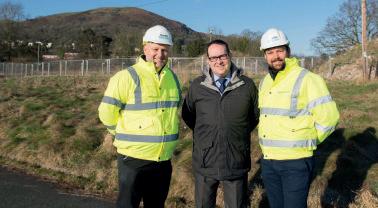
Fortis Living has appointed Malvern building contractor Speller Metcalfe to begin work on 92 new affordable homes in Malvern.
The development at Pickersleigh Grove will replace the 42-home post-war development which was demolished in 2016 and will extend to land adjacent to the site bought by Fortis Living.
The multi-million pound development will include a mix of 60 two, three and four-bedroom houses for shared ownership sale plus eight two and threebed houses and 24 one-bedroom flats for affordable rent.
The Pickersleigh Grove development will
be the largest land-led scheme that Fortis Living has delivered to date and will provide much-needed affordable housing. It is also the biggest housing scheme yet for Speller Metcalfe’s Living Division.
Fortis Living, one of the largest housing providers in the West Midlands, procured the project through the Homes England agency Delivery Partner Panel 3 (DPP3) Framework.
Speller Metcalfe Pre-Construction Manager Rob Ackerman said: “We are delighted to be working with our long-standing client Fortis Living on this exciting new project.”
Harris Lamb’s Building Consultancy team has overseen the £250,000 refurbishment of three industrial units in Kidderminster as landlords continue to recognise the need for high-specification stock throughout the West Midlands.

The project saw the team oversee works at units 1-3 at Vale Industrial Estate in Stourport Road to bring them into a marketable condition.
Formerly occupied by Specsavers, the units have undergone a full strip-out of fixtures and fittings, been redecorated,
refurbished and had the external areas overhauled and improved.
Harris Lamb’s Gareth Booker, from the building consultancy team which managed the contract, said: “While developers are now building new parks throughout the region, the demand for high-specification industrial stock throughout the West Midlands has not abated, and landlords of existing sites have seen the opportunity to invest in improving their own assets.
“Where new buildings are thin on the ground, or out of some occupiers’ pricerange, those sites refurbished to an ‘as new’ condition are proving very popular. The standard of this refurbishment is particularly high.”
The business is marketing the units to buy as a whole, or to let in part or in their entirety.

Home care operator Helping Hands has launched a new office in Bromsgrove with a little help from Redditch property agent John Truslove.
The Alcester-based organisation has taken 690 sq ft at 8 Stourbridge Road on a five-year lease.
The Redditch and Bromsgrove branch was formerly run out of Alcester. Branch Manager Sarah Underhill said: “We wanted to be closer to our carers and their customers.
“Our aim is to ensure our customers receive the best possible care so that they can remain as independent as possible in their own homes, and the new Bromsgrove office is an extension of that commitment.”
Four staff are based at the branch, managing domiciliary care services.
John Truslove acted on behalf of the landlord. Paul Blennerhassett of Bruton Knowles acted for Helping Hands.
“Our aim is to ensure our customers receive the best possible care so that they can remain as independent as possible in their own homes, and the new Bromsgrove office is an extension of that commitment”Sarah Underhill of Helping Hands with Ben Truslove of John Truslove Exterior of the units at the Vale
The future provision of primary healthcare for a growing Warwickshire community has been secured following the completion of a land acquisition deal, negotiated by real estate law specialists at Midlands firm Lodders.
Work has begun on the new £4 million, 1,400 sqm Wellesbourne Medical Centre, which will replace the village’s Hastings House surgery and provide a fit-for-purpose primary care facility to be used by GPs, nurses and other community healthcare providers.

With completion scheduled for early 2019, the new building will be three times the size of the current surgery and provide a primary care facility at the heart of the village, with 24 clinical rooms and improved access to an increased range of services.
Head of Lodders’ real estate practice Paul Mourton led the firm’s team, working with the surgery’s healthcare practitioners headed by senior GP partner Dr Martin Read-Jones.
Working closely with the trustees of the Walton Estate, NHS England, the local South Warwickshire Clinical Commissioning Group and a team from Persimmon Homes (which is building a 350-home development in the village), the land acquisition paved the way for the medical centre.
CARTER JONAS CHOSEN AS REGIONAL LETTING AGENT FOR SILVERSTONE PARK
Carter Jonas has been appointed as the regional letting agent for Silverstone Park – joining national agent DTRE which has worked on the Silverstone Park instruction for the last four years.
The 130-acre estate sits at the heart of the Silverstone Technology Cluster and Carter Jonas’ experience of the region proved instrumental in it being awarded the contract by Silverstone Park developer MEPC.
Jon Silversides, Partner, Commercial, Carter Jonas, said: “While the appeal
of this location to the motorsport community is obvious, we believe that the offering here will be of interest to a much wider scope of occupiers for either geographic reasons or the attraction of the locally-based and highly-skilled precision engineering workforce.”
MEPC’s Roz Bird, Commercial Director at Silverstone Park, said: “There is terrific value in appointing Carter Jonas as our local agent. They will be able to champion Silverstone Park in the local property market and provide local market analysis.”
A family-run business which distributes vital safety equipment to emergency services across Europe has relocated to new premises in Warwick.
Emergency Vehicle Products Ltd (EVP), set up in 2014 by Paul and Sarah Garner, has moved into Benford Court from Heathcote Industrial Estate in a move supported by Coventry-based solicitors Band Hatton Button.

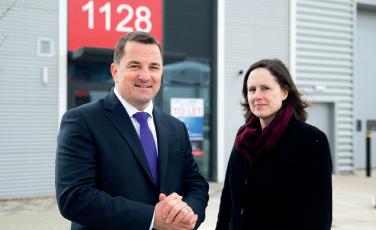
EVP helps police, fire and ambulance services in major cities such as Berlin and Amsterdam to keep up-to-date with the latest technological advances for their vehicles such as dashboard cameras and trackers.
The business acts as the authorised representative on mainland Europe
Paul Garner said: “Benford Court is a lot more suitable for the way in which our operation is split between admin and warehouse work.”
James Leighfield, a solicitor in Band Hatton Button’s Commercial Property Department, negotiated the lease for EVP to be based at Benford Court.
Commercial Property
EVP moves to Benford Court in Warwick as it looks to expand

